#Been thinking a lot about the philosophy of this series in response to all the political horros we've endured
Photo
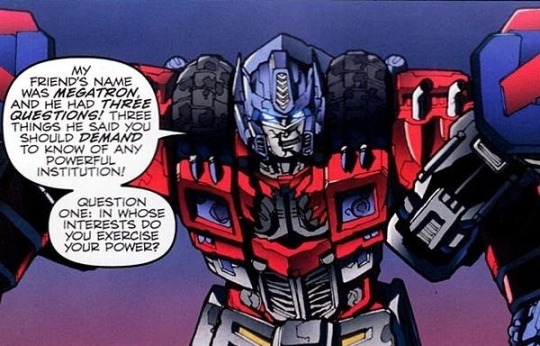
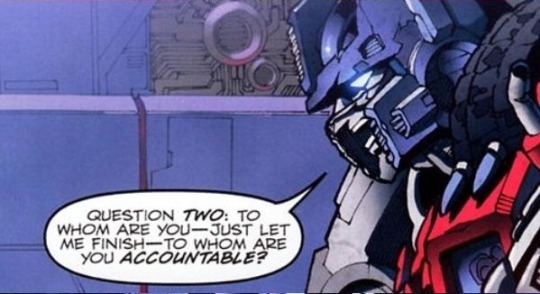

Lads wake up, insane new meta just dropped.
The fact that it wasn’t even intentional makes this 1000x better.

#Transformers#Megatron#Optimus Prime#Optimus#I talk#primordial robot hell#GOSH I HAVEN"T USED THAT TAG IN A HOT MINUTE#transformers analysis#Chaos Theory#Been thinking about this exchange a lot given Recent Events#Been thinking a lot about the philosophy of this series in response to all the political horros we've endured
3K notes
·
View notes
Text
In the time of Eden
Fanfic Comic Hazbin Hotel
Part 20
FINAL
(Warning: may contain scenes of violence that may be uncomfortable for some people)
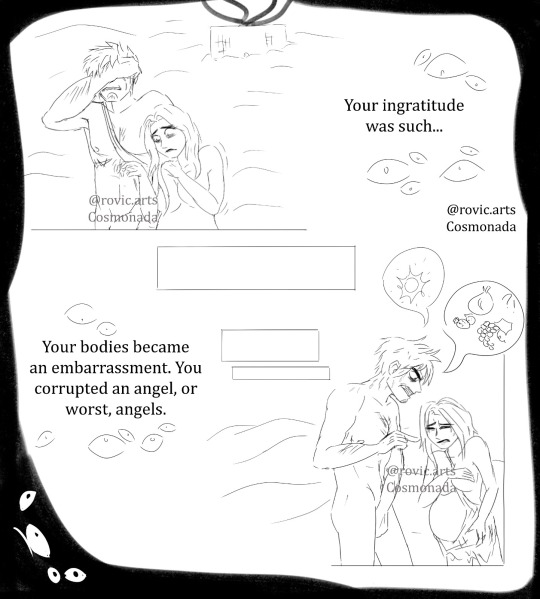


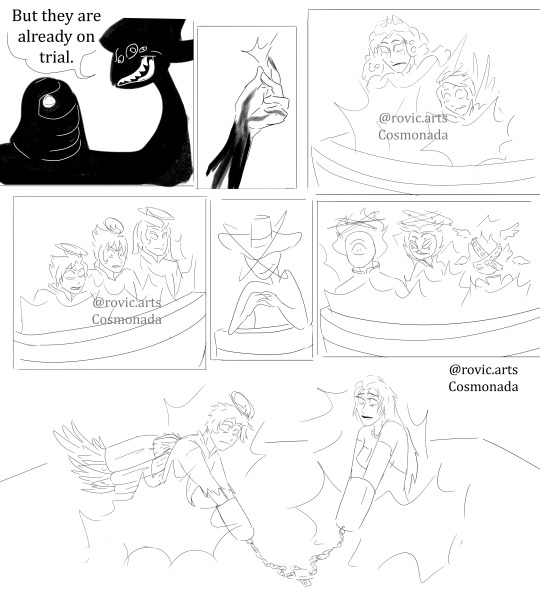

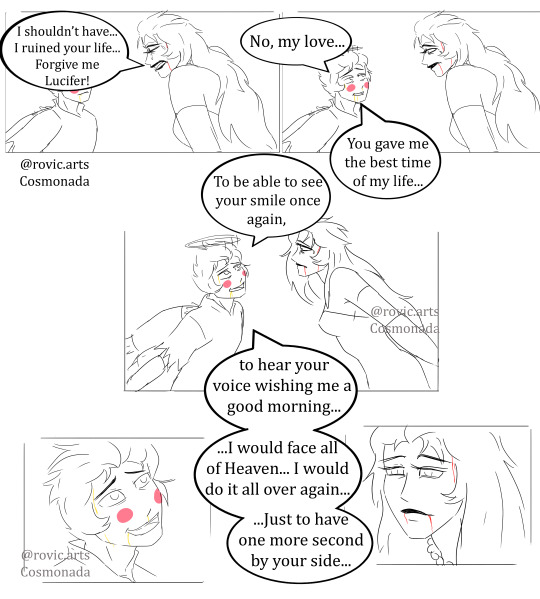


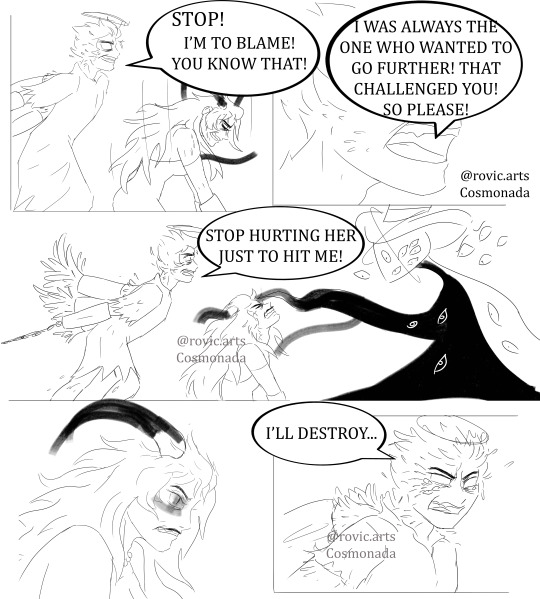






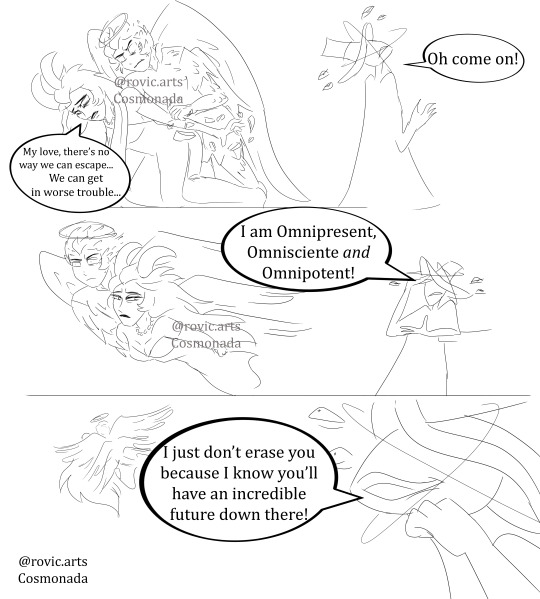

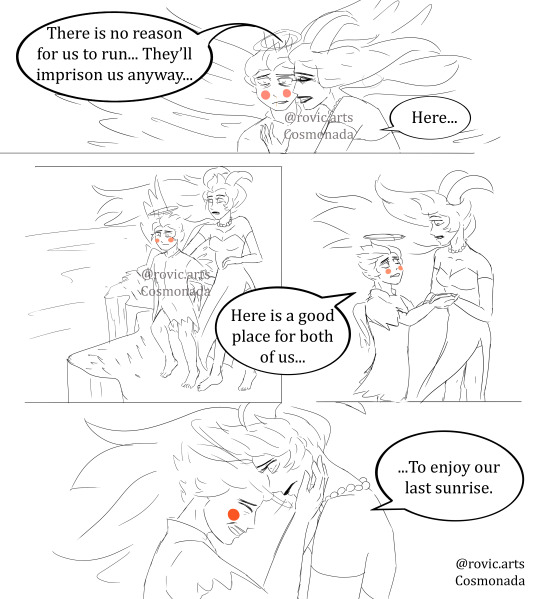

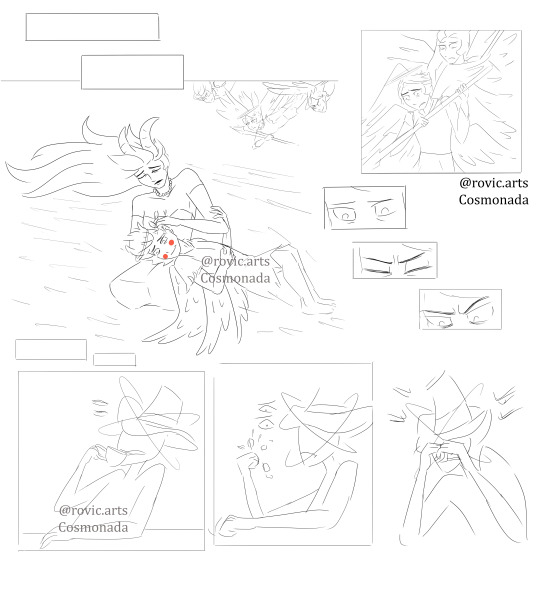


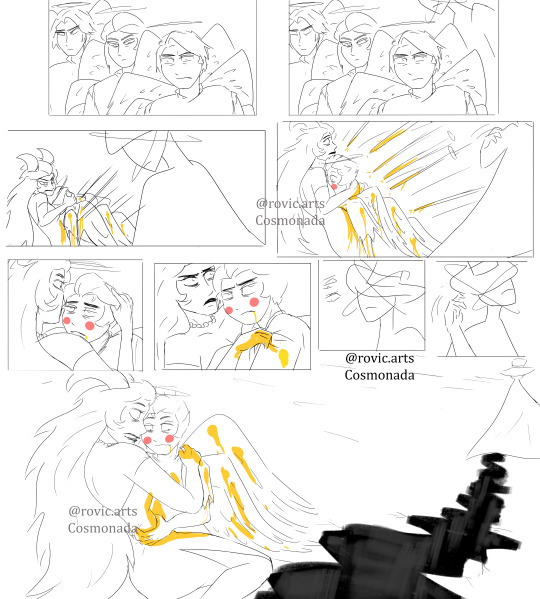





A few final thoughts. I made it into the plot of the comic that God would have the side of chaos and harmony, but that he refused to have the side of chaos, thus creating hell. This is quite different from what the original series intends to do (probably), as there is a possibility that there is a character Roo or that there is a character that symbolizes all evil. I hope with all my heart that it's not that, I think the idea that there would be a final villain who would be responsible for all the evil so… lazy.
Because it would be enough to defeat this evil and that's it, happy ending. Not to take it to one side about belief, but it would be awesome if the show embraced the idea of evil/chaos. Because it would be enough to defeat this evil and that's it, happy ending. I don't want to take it to one side about belief, but it would be amazing if the series embraced the idea that evil/chaos is part of life (other religions see chaos/evil as a new beginning, a transformation, and science itself and some aspects of philosophy this chaos, this failure, is where the evolution/adaptation of new beings occurs…).
Anyway, I have high expectations with the series, after all it's still my hyperfocus (it's been 4 months, that's a lot for an ADHD!!), and I hope the plot I followed has pleased you readers!
I would like to thank everyone who has followed the comic so far! It was a lot of fun for me to imagine what these characters were like in this period so far removed from the original series.
And for those who want to follow along, there will soon be another fanfic comic (I intend it to be only two chapters, but with up to thirty pages) focused on Adam and Eve.
#hazbin hotel#hazbin hotel fandom#hazbin#hazbin hotel fanart#artists on tumblr#hazbin hotel lucifer#lucifer morningstar#hazbin hotel adam#hazbin hotel art#hazbin hotel comic#comic hazbin hotel#in the time of eden#lilith x lucifer#lucilith#lilith hazbin hotel#lilith morningstar#hazbin adam#lucifer x lilith#comic
166 notes
·
View notes
Text
Toru Oikawa headcanons

Friendly reminder that English is not my first language. You can check my Masterlists both in English and Polish here. Consider supporting me on Ko-fi.
Other headcanons from this series can be found here.
• Relationship with Toru would be a bumpy and winding road, one that is sometimes nice and pleasant and then turns around and leads you through the worst forest you have ever seen in your life. I think Oikawa would fall in love with someone who blew his mind with their indifference towards him. It doesn't matter if you were a childhood friend or someone he happened to meet at highschool. It would be important for him whether you don't treat him like his fans do.
• Winning the hearts of the girls he could have easily wouldn't be a challenge at all. And the best things always require effort and work. He follows this philosophy in volleyball and it would be no different in the case of love.
• You can hit him on the shoulder and in the head with books for every stupid comment but if he sets his sights on you, you can be sure that he won't give up. A relationship with him would consist of flirtations that you wouldn't take seriously and rare, serious moments when you would feel that what he was saying was sincere and came from the heart. Of course, someone or something would always have to interrupt you.
• Have you styled your hair? He will destroy it. Is this a new hair tie? Now it's his, he'll keep it for good luck. Who gave him permission? He gave it to himself. Same case with casually adding -chan to your name...
• Hajime would be the greatest wingman in your relationship. For a long time he would say that Toru needs to take care of himself because he doesn't deserve you but eventually he would realize that you couldn't live without each other. He wouldn't push either of you to confess but he would certainly discreetly try to give you as much time alone as possible. And it's not easy to find excuses for so many Aobajosai members...
• Toru knows what he wants. And although you would have to wait to hear it in a serious and mature way, it would have been worth it. He would go for a walk with you somewhere on the boulevards, by the water with a nice view. Surrounded by the dim, night lights, he would tell you how he felt. And these would be sincere words. Different from those that he feeds many people on a daily basis. Thoughtful and adequate as always but not superficial, hidden in the depths of his mind when he thinks about your smile in his free time.
• Oikawa likes it when you take off his glasses and then kiss him. He jokes that it's a bit like a scene from a movie. And it's even better when your friends are watching. Let them be consumed by jealousy. One time Kageyama asked you if you were sure you knew what you were getting into.
• Half of the serves since you became a couple are dedicated to you. At training, in high school, he will shout about it loudly, as long as you are anywhere nearby. In more serious matches, when he got into the Argentine national team, he simply put two fingers to his lips and blew a kiss towards the audience. Half the fans were dying of delight before they finally realized you were in the bleachers.
• Sometimes it's hard to balance a career as a professional setter with daily responsibilities. You travel with Toru but for most part, your relationship is a long-distance type. You talk a lot on the phone and on video calls. You get as many discounts on airlines as possible to see each other as often as you can.
#oikawa toru x reader#oikawa tooru#haiykuu!!#haikyuu x reader#headcanons#25/7#haikyuu#oikawa x reader#toru x reader#kageyama tobio#hajime iwaizumi
100 notes
·
View notes
Note
hey! i really enjoy your analysis of aang and zuko's relationship, and i was just wondering if you have any thoughts on this:
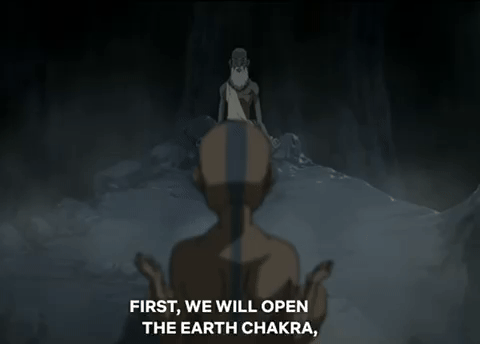
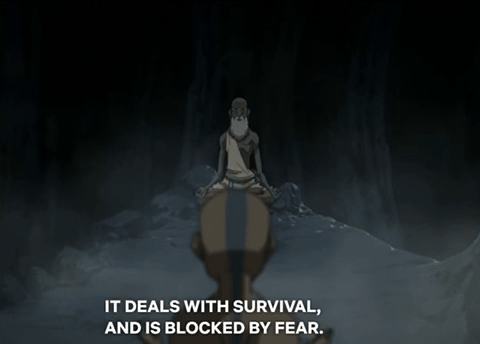
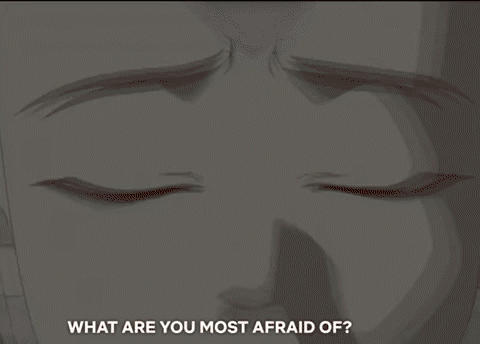
when aang considers what he's afraid of the most, he doesn't just see zuko - he sees the blue spirit. why do you think his fear is linked to that mask? zuko was the most amicable towards him when he put that mask on, and was hostile every other time.
Ooooh!! This is such a rich and meaty question!! And it's something I've wondered about but never dove into before.
I guess there are a couple of questions we need to explore. One, do we want to begin to analyze this from Aang's perspective or the series' themes, which, when put together, should offer us the fullest idea of what the intent might be? If we begin with Aang's perspective, then the next question we need to next ask what is Aang's view of Zuko and/or the Blue Spirit at this point in the narrative? My worry about beginning at that intimate level is that we might miss possible connections that a thematic understanding might facilitate and may, like many fandom analyses, leave it at a character level when, in fact, the characters exist to serve larger philosophical purposes, especially in a show like ATLA.
So, we'll return to those questions about Aang after we visit some questions about the broader themes here. We know for a fact that the team did a lot of research into Eastern philosophies that they had to then pack down into 24 minute episodes, preserving a surprising amount of complexity not in the words but in the actions and visuals. The 2 part Crossroads of Destiny episode is probably the most evocative of this practice. The four-way fight scene is celebrated for the way it masterfully shows character development through fight choreography. Then, Aang's crystal chamber he forms to master the Avatar State is a direct reference to a statement about pre-enlightenment in one of the foundational texts about Japanese Zen for American Buddhists, "The Three Pillars of Zen." The rapid explanations of the seven chakras with Guru Pathik might seem like a a skimming of Tantric beliefs based on the brief statements and processing, but it's another prime example the way ATLA suffuses meaning beyond the script.
What more can be said about the Earth (also called the Root or Muladhara) Chakra, then, that the show might reflect without stating it explicitly. Guru Pathik explains that the Earth Chakra "deals with survival." Is there any subject more prescient than that for our protagonist, the single survivor of an otherwise all-encompassing genocide? Other accounts of this chakra that I can find explain that it's at this chakra that one can observe that their base needs are being met--enough food, enough water, etc. There seems to be a subtle witnessing to the effects of PTSD here then. With this chakra untouched, unopened, and out of balance, Aang within his mind has been living in a state of emergency without knowing it, believing himself at a core level beyond his consciousness to still be under immediate threat even in moments of peace like his meditations throughout the opening of his chakras. "Your vision is not real," Guru Pathik points out, not to say that no danger exists for him in the world but to illuminate the immediate reality surrounding his person.
The memories and visions that flash during the sequence hint at how fear conceals deeper realities and thus possibilities. I'll start with the clip of Katara sinking away from the first episode of Book 2, "The Avatar State." The Earth Kingdom General performed this cruelty after many other attempts to force Aang into suffering to gain the Avatar State. Believing he lost another person he loved, the state was triggered despite the actuality that Katara was unharmed. The fear of her loss overwhelmed Aang, and even her safe return could not assuage his traumatic response. The Blue Spirit incident forms a striking parallel to this event, in that case. Aang felt himself helpless and in danger only to discover the opposite: the seemingly malevolent force freed him from danger. Further, that Blue Spirit Mask concealed Zuko who, by the end of the series, will be revealed (to himself and) Aang as an ally and a friend. The shadowy image of Ozai, then, connected with these two fear-inducing semblances, can be seen then as perhaps the ultimate foreshadowing of Aang's ultimate success in pacifying Ozai. Put in the context of this chakra and the other two visions, it frames the Firelord as a facade meant to induce terror and distance, when in reality, life and humanity still lay behind the horrifying megalomania.
Concerning the Blue Spirit element specifically in the series, I want to explore one more factor within the series before getting back to Aang's character relationship in this moment. Blue has a running symbolic theme within the series that seems especially relevant here since it played a huge role in a highly symbolic part of the directly previous episode, "The Earth King." As Zuko rides out his psychogenic fever induced by releasing Aang's bison and abandoning his Blue Spirit mask, he is confronted in his dreams by a blue dragon voiced by Azula and a red dragon voiced by Iroh. I felt really confused by these two would-be shoulder angels for the longest time (literally until I was sorting my thoughts out to write this) because Azula's blue dragon is the one who entreats Zuko to rest, which even in Grey Delisle/Azula's clearly threatening tone--she even ends the temptation by saying "sleep just like mother!"--seemed to be what Zuko needed to do as opposed to the red dragon's exhortations to get out. I could see how sleeping might also refer to accepting his upbringing without thought, but why blue? The layers upon layers of possible meaning overwhelmed me.
I posit that blue in the series, especially when put in relationship to red/orange, as it is in the dream sequence, the dynamic between the water tribe and the fire nation, the fire of zuko and azula (especially the final agni kai), and the energy-bending of Aang over Ozai in the finale, ought to be read as Yin (making red/orange yang). Yin is passive, retractive, and receptive, which makes the invitation to rest by a blue dragon make perfect sense. Yin is also feminine in nature, hence the association with both Azula (whose blue fire and lightning becomes especially interesting to explore under this understanding) and Zuko's mother in the dualistic dragon dream. If you know anything about yin and yang, you know that it's key tenet is ever-changing coordination of yin and yang within one entity and with relationships between entities rather than the privileging of one above another. The two dragons in Zuko's dream, while seemingly in opposition to one another, are actually seeking, like the bumper stickers say, "coexistence" of their dispositions.
Now, back to Aang's vision of fear over the Blue Spirit. The red that overlays everything is specifically a reference to the Earth Chakra, which is symbolized by the color red. But the fact that he has one fear of Katara, the pinnacle of blueness/yin in the series, dying, and another fear of the Blue Spirit, a de-flamed (read: emasculated) Zuko attacking him that are then overlayed by this Earth Chakra red, a color otherwise used to portray yang (masculinity, activeness, expansion, and repulsion) and the fire nation in the series, suggests that his fears are specifically about within holding onto yin nature (symbolized by his grasping for a disappearing Katara) without being entirely overwhelmed by it (in the image of the fear he felt as the Blue Spirit approached his imprisoned body). And all those fears are intensified when living in such a patriarchal, or yang-skewed age and society, which gets depicted through both the final image of Ozai, the ultimate patriarch within this world, and the red coloring.
I promised I would get back to the characters, and after that hopefully illuminating thematic expansion, we can hopefully get at the core of what's going on here for Aang personally and what it might mean for him to be picturing Zuko with the Blue Spirit mask as a fear. I want to put this moment into context with Aang and Zuko's relationship at this specific moment. Aang hasn't seen Zuko since he watched him cry over his uncle in the ghost town after Azula struck him with lightning as a diversion. That was ten episodes prior (and more than 6 months time if you were watching the show in real time as it premiered; May 26th-Dec. 1st). The next time Aang sees Zuko, two episodes later, they are glowering across a crystal prison cell at one another with antipathy as they're embraced (a gesture I can only remember from the fantastic black romance film Love & Basketball, and in a gay context that is clearly referencing that moment in L&B, in the Norwegian teen romance series Skam). Right before this scene, Aang readily agrees to co-rescue Zuko and Katara with Uncle Iroh despite Sokka's protestations. Nothing seems amiss with Aang, no obvious belligerence toward Zuko until he sees him. Zuko has barely seen the airbender this whole season, and the one moment they encountered one another, Zuko was attacking Aang's attacker rather than him. Why is Aang expressing anger toward Zuko in the crystal chamber then? It's a rare expression from Aang even when we look at their more antagonistic interactions from the first season.
Here's where this vision of the blue spirit Aang envisions as he opens his earth chakra might enliven his characterization and his relationship to Zuko. We get two pieces here. His attachment to Katara and the queer implications of his partnership with the Blue Spirit/Zuko. And they are inseparable.
I don't feel that I need to especially dive into the attachment to Katara since it's been a pretty big component of discourse within the fandom, both in general analysis and more specifically relating to the (literally historic) shipping wars between zutara and kataang that emerged after the series came out originally. What I'll say here is that the first vision that Aang has as he addresses his root chakra points to his fear of losing her and what she represents pretty explicitly and, as I suggested earlier, also provides its antidote in the realization that accepting/surrendering the fear of impermanence reveals its simultaneous illusion. Katara wasn't actually harmed and wasn't truly lost when the general subsumed her into the ground. Aang has to let go of her as a permanent fixture that he'll always be able to see and know entirely (not, as many have interpreted it, let go of loving her). He'll also have to let go of saving her and the world of so many others she represents, which is as much a pressure and role Katara and others put on him as Aang yolks himself to.
Part of this acknowledgement of Katara's impermanence as a living being and a romantic possibility is addressing the others in her life who pose both danger and attraction for her. Zuko embodies both of these things simultaneously. The aggressive stare Aang launches at Zuko in "The Crossroads of Destiny" can be understood through this lens. The Eve Sedgwick's concept of the triangulation of male homosocial desire between romantic rivals was one of the foundational ideas of queer theory. It's so well-established as to be a meme among the tumblr crowd. The show even references the history of these literary homosocial tropes in "The Avatar and the Firelord" as Sozin and Roku's tight-knit youthful friendship is slowly rent apart at the event of Roku's heterosexual marriage, which thus begins the imperialism of the Fire nation.
Except that Roku and Sozin aren't romantic rivals. And Zuko's obsession with Aang begins sans Katara. And, as you pointed out, if the romantic threat is Zuko, it ought to be Zuko in the Earth Chakra vision instead of the Blue Spirit? Well, those all exist because ATLA is not a tragedy for homosocial relationships, and it's hard for me to explain how groundbreaking that was.
You see, the show theorizes homosociality differently. If Aang is required to let go of Katara, he has no pivot point, no object (because women shouldn't be objects for male fodder!) to connect with and compete with a rival male, so he has to look directly at the desire of another male for him and, therefore, face the fears that he might have similar desires. I said above that the Blue Spirit is an entirely de-flamed Zuko, which I then paralleled to emasculation. One could even go farther to call it a kind of symbolic castration (Firelord Ozai losing his firebending at the end of the series certainly demands this kind of reading). These aspects ignite fears about lacking masculinity which then cause reactions, which make men avoid accepting any thoughts and behaviors associated with vulnerability and homosexuality invoked within themselves or by others.
I think Aang, in his way, is confronting these fears but not from the angle of someone raised within a homophobic or misogynistic culture. His openness to Zuko and the potential of connection to him is ripe from the first time they meet--"you're just a teenager" connects them without any intermediary. He comes to understand the rigidness of the environment he's in, though. He feels like he's being forced to choose between a yang/masculine role he plays with Katara, who at this point in the series though growing out of it and certainly not a fault of her own making still sees him as her savior and depends on him to save her and the world through metaphysical mastery and the repulsion of evil, and yin/feminine role he plays with Zuko, who finds Aang in and forces him into positions of elusion, surrender, and passivity, while requiring his compassion and forgiveness. When the Blue Spirit comes swinging his swords (read that with all the innuendos you want lol) at a shackled Aang, it's the ultimate expression of Aang's potential for submissiveness because, not only is he entirely helpless but the one who could harm or save him in that scenario is another who is not participating in the expected power of fire/yang/masculinity.
I think everything in the show says this is attractive to Aang--that he remains with Zuko immediately after their escape from the fort, that he reflects on the Blue Spirit as he opens his chakras, that a reference to the conversation that followed their escape that Zuko makes halts him in his tracks when Zuko asks to join the team. Zuko's Blue Spirit persona means a lot to Aang, a scary amount, and my point is that it's this fear of the meaningfulness of their encounter as two men who are not the masculine paragons they are supposed to be which Aang faces as he opens his chakra. As much as he wants Katara, he wants Zuko. He fears he'll lose Katara and he fears he'll lose his life to Zuko. These are the dichotomies he's tackling as he processes the Earth chakra.
Aang eventually opens the chakra, but that's only to say he acknowledges and surrenders his fears to a destiny and understanding beyond his control, not that he necessarily learns how to address and solve all the conundrums contained therein. We know he chooses his attachment to Katara at the end of the episode to obtain power over the Avatar state but perhaps we could've been clued into this choice by noticing he has not chosen Zuko with that initial glare Aang gives him. Aang hasn't found a way in his chakras or his heart to hold both Katara and Zuko at once, so he chooses Katara and expresses a newfound jealousy and rivalry toward Zuko (not that Zuko's at his best behavior at this point, but it's Aang who initiates the exchange).
By the end of this season, Zuko abandons the Blue Spirit mask and Aang loses his life for prioritizing Katara and a yang-centric mastery of the Avatar state. The next season involves all three of the protagonists finding more internal balance between yin and yang for themselves and accepting mutually reciprocal feelings for one another that allow them to escape the kinds of patriarchal tropes that have dominated Anglo- literature for centuries. The ability of this brief sequence to highlight so many of the series' central revolutionary themes speaks to the depth of the show and the way it invites the audience to think about rich subtext rather than pedantically hammer us with morals will just continue to be the gift that keeps giving from this show.
Thanks so much for asking! Didn't know how much I missed doing a deep dive into this kind of stuff.
83 notes
·
View notes
Text
Judaism in Moon Knight (or, How Steven Is Marc’s Emotional and Spiritual Protector)
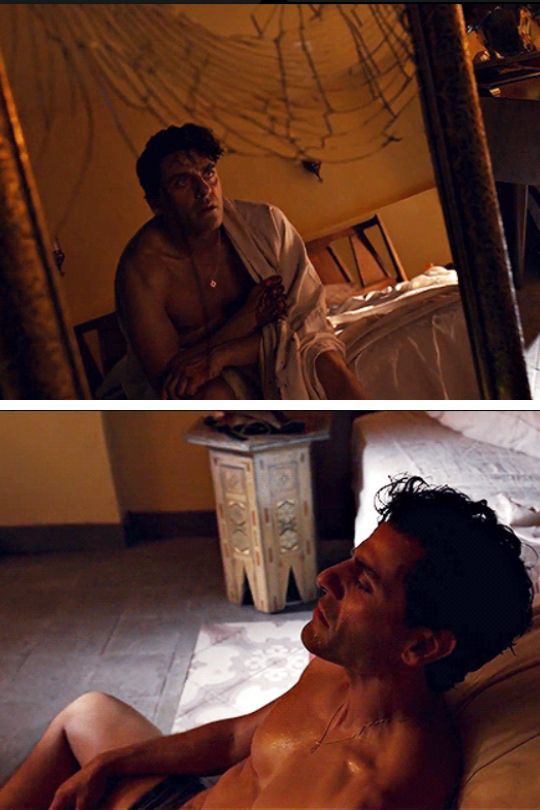
Sooo I've been thinking a lot about Marc Spector's relationship to Judaism in the Disney+ show. This week in particular (in light of Jeremy Slater’s recent comments), I’ve been thinking about the ways that Marc has put walls between himself and his Jewishness. This is a trauma response, of course. And those of us who experience trauma have walls for a reason. As a Jewish person, I have high trauma walls in relation to my Jewishness, which is why Marc’s arc in Moon Knight resonates with me so strongly.
Marc has been disenfranchised from his Jewishness in three key ways. These are actually the pillars of Jewish identity: Believing, Behaving, and Belonging. I’ll bring more clarity to this later on.
The one thread that ties both Marc and Steven to their Judaism is the Magen David necklace that they share. And indeed, we can chart the course of Marc’s relationship to his Jewishness by following the appearances of the necklace.
When we meet Marc, he has distanced himself from most sources of connection in his life, and he states repeatedly that he wishes he could disappear. He tells Steven, “Look, when I am done, when I have repaid my debt, I swear to you, you will never see me or hear from me again.”
Jeremy Slater has spoken about how he wrote Marc as Steven's protector, but I want to challenge that as well. And that’s certainly not how Oscar was playing him.
You see, I keep coming back to a moment in Episode 2. It’s the scene where Steven stands up to Harrow and his cult.
I think this is the moment where we first witness Steven as Marc’s emotional protector, which becomes more and more evident throughout the course of the series, until Episodes 5 and 6, where Oscar makes this alter dynamic clear.
However, I believe that this scene is where we see Steven become Marc’s spiritual protector, as well. Because Steven appears to have the closest connection to their Judaism.
At the end of Episode 1, Marc presents himself to Steven (and to us) as a protector of the system. “You’re not going to die. Let me save us.”
But as we learn throughout the course of the series, Marc is really more of a trauma holder. Yes, he has military training (as well as a healing factor and a nearly indestructible suit from Khonshu), but that doesn’t necessarily equate to him having a protector role within the system.
By the end of Episode 4, we start to see the actual dynamic emerge between Marc and Steven, where Steven is Marc’s protector. Jake is a protector as well — both physical and emotional. He defends the system when Marc and Steven are in physical danger, and he also fronts when Marc is at emotional risk or in danger of self-destructing.
In Episode 2, we learn from Layla that she and Marc have been searching for Ammit’s ushabti for several years. Marc knows that what Harrow is doing is potentially world-ending. If Ammit is released, she will consume much of the earth’s population. It’s Thanos 2.0.
But Steven sees beyond the Avengers-level threat that Ammit poses. He senses the deeper nature of her existential and spiritual threat.
Ammit represents a doctrine of deterministic prejudgment. According to her philosophy, everything good or evil can be known about us from the moment that we are born. And if the bad outweighs the good, Ammit holds that we should be destroyed. She believes that we have no ability to grow or improve. We are stuck on a fixed path with no possibility for change.
This runs contrary to the concept of free will, in which we all have the capacity for change and growth. Even if we do something wrong, we can make amends. We can choose differently next time. Our lives are not represented as a fixed line; rather, they are a series of branching decisions. And we can always choose to do the next right thing.
In the final battle between Khonshu and Ammit in Episode 6, Ammit asks, “Why fight, knowing you will fail?” To which Khonshu replies, “Because it is my choice! The very thing you take away.”
Free will is a primary concept in Judaism. There is no afterlife (at least, not in terms of heaven and hell), and so LIFE is for living. We can always change. We can choose differently next time. There is room to learn from our mistakes.
But Marc has already bought into Ammit’s philosophy. His mother taught him that. Wendy was the human embodiment of Ammit’s form of prejudgment. It is absolute, inflexible, and with no possibility for change. If you are good, you are good; and if you are bad, there is no hope for you. After Randall’s death, Wendy says to Marc, “I should have known you’d do something like this.” She places all the blame for Randall’s drowning on Marc’s shoulders, even though he was just a child.
And so, Marc believes that he is bad, and that nothing can change that. He sees no possibility for his own redemption. He fights against Ammit and Harrow to protect the world, but on some level, he believes that for him, she might be right.
It is up to Steven, the emotional and spiritual protector of the system, to challenge Ammit’s philosophy. And why Steven? I believe it is because Steven has a greater connection to their shared Jewishness.
In the “lentil soup” scene at the cult compound in Episode 2, Steven converses with Harrow to figure out more about what is going on. It’s clear to him that Harrow has information about the experiences he’s been having with Khonshu. But as he and Harrow talk, he begins to understand the true implications of Ammit’s philosophy.
There is a specific moment in the scene. A specific point where Steven shifts. Up until this point, he has been terrified. He’s terrified of what is happening to him, he’s scared of Marc, he is positively quaking at being trapped by this cult.
So what changes? Steven looks in the reflective surface of the soup bowl, and he sees Marc retreating to get away from Harrow’s words.
Harrow tells Marc (through Steven) that Khonshu is weak and ineffective. That his punishments come too late. However, this is the nature of free will. We are given the choice to do good or bad. The punishment cannot come before the crime. As painful as it may be, we must allow people to make mistakes. And we must allow them to grow and change and redeem themselves when they fail.
Then Harrow reminds Marc that he will never be free of Khonshu, because there is always one last thing. One last mission. One last evildoer for Marc Spector to punish, when the problem could be solved so efficiently and with so much less mess if Ammit were just allowed to rule.
Marc starts to withdraw at these words, and Steven watches him. Then Steven has a moment of choice. He chooses to defend Marc. Even though he still believes that Marc (and therefore the body) may be dangerous, he knows that Harrow has no right to judge Marc or anyone else for what they might do in the future.
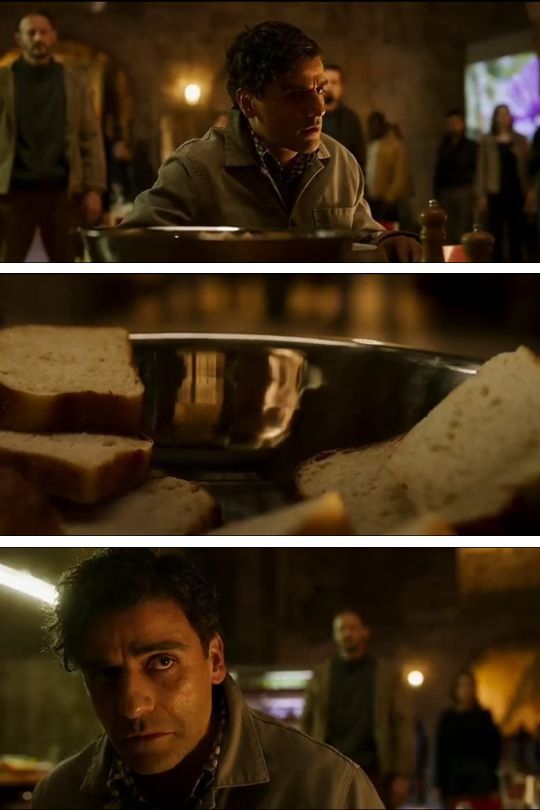
Steven says, “If Ammit judges people pre-evil, like, before the fact, then, isn't she judging an innocent person? I mean, a thought can't be evil, can it?”
Then, instead of placating Harrow or trying to find the nearest exit, Steven looks at the cult in disgust and says, “You're all into that? Killing children? Maybe it's just me, but I draw a line at child murder.” He doesn’t run, even when Harrow starts to threaten him with Ammit’s staff. He has seen how uncomfortable Marc is at Harrow’s deterministic zealotry, and he knows that he has to take a stand.
But why is this important from the standpoint of Marc’s and Steven’s respective experience of their Jewishness? And why is Steven able to be Marc’s spiritual protector? Why can’t Marc do this himself?
The Moon Knight show gives an incredibly realistic depiction of how a person becomes disenfranchised from their own Jewishness. Being Jewish consists of three pillars: Believing, Behaving, and Belonging. If any one of these pillars is knocked down, the ceiling will start to collapse. But if all three are knocked down, the person's connection to their Jewishness can be destroyed, or at least deeply damaged.
In the show, we see that these three pillars of Marc's faith have been knocked down in an unfortunately common way: he has experienced abuse and rejection from his family, specifically his mother. This abuse has a spiritual nature, because in Jewish families who actively practice their faith, the mother is often the one to maintain the traditions of the Jewish home, which is what is necessary for a child to participate as a Jew in the community. Without that Jewish home life, it is easy for a child to be cut adrift, even if they go to Hebrew school and attend their Temple or Synagogue.
In the time and place that Marc was growing up (in the American Midwest of the 1990s and early 2000s) the fastest way for someone to be disenfranchised from their Jewishness was to sever their connections to Judaism in the home.
Steven is the one who maintains a connection to their Judaism. He is vegan, which is a common strategy that Jewish people use to keep kosher outside of the house. He also has a mezuzah on his door, which serves as an indicator of a Jewish home. He belongs to the Jewish community in London, and speaks with the cadence of a regional London Jewish accent (Oscar said that Steven’s accent was based on Jewish people he met in the Borough of Enfield). The pillars of Steven’s Jewishness haven’t been knocked down. He still Believes, Behaves, and Belongs, at least to some degree.
But it is the Magen David necklace that gives us the metaphorical throughline of Steven’s role as spiritual protector.
We first see the Magen David around Steven’s neck at the end of Episode 2. We can see it clearly as Steven “looks out” from the mirror. A beam of light hits the necklace, and it shines. It is right in the middle of Steven’s chest. At the center of his heart.
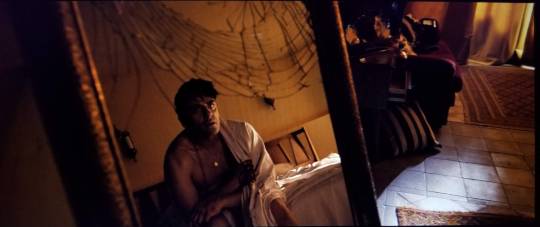
As the camera pans over to Marc, we see the necklace chain, but the Magen David is obscured by the direction of the light and the angle of Marc’s body.
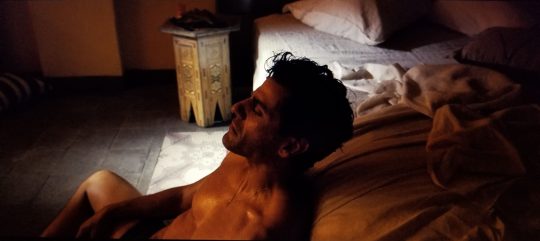
Both Marc and Steven wear it — it is actually the single item that they both consistently share — but we don’t see it VISIBLY on Marc until Episode 6.
In Episode 3, we catch a glimpse of the necklace when Marc is changing his shirt in Layla’s car. But we only see the chain. We don’t see the Magen David. It is cut off.
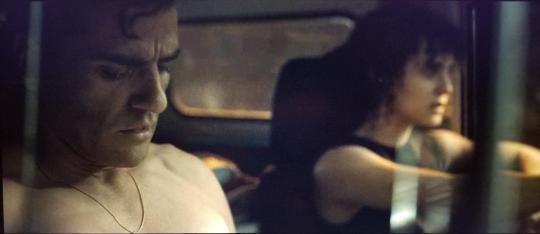
When Marc is shot at the end of Episode 4, both the necklace chain and the Magen David are obscured. We cannot see them at all, even though at other times throughout the show, we can see at least the chain of the necklace peaking out from Marc’s shirt.
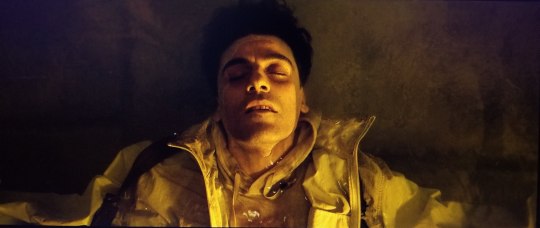
BUT!!! After Marc has connected with Steven in the Duat, after he has gone through this part of his hero’s journey, after he has finally allowed Steven to come into his life, the Magen David finally appears on Marc’s chest.
As you can see, it was NOT THERE before, when Marc fell into the water in Episode 4. Nothing physically has changed at the beginning of Episode 6. In fact, only minutes have passed in the upper world since Marc was shot. But because of Marc’s journey with Steven, he can finally begin to cross the chasm and reconnect with his Jewishness. The Magen David may not shine like it did on Steven’s chest, it may only glimmer, but it is a start.
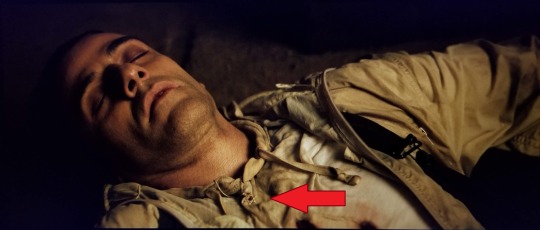
I believe that it is through Steven that Marc is able to reconnect with his faith. At the end of Episode 6, Marc finally expresses his free will. He will not kill on Khonshu’s orders, even though it would mean ending Ammit as a threat. He has a choice, and he chooses LIFE. In Judaism, life is for living. In death, there can be no change. Without reconnecting to Steven, to his Jewishness, I don’t think Marc would have been able to make this choice.
And of course, that does leave Jake, as Marc’s emotional and physical protector, to make sure that Ammit and Harrow never hurt the MK system again. Because I believe that of the three alters, Jake buys into Ammit’s philosophy the least. Jake knows that Ammit is a threat, and he knows that she has to be destroyed, but he never entertains that she might be right in the way that Marc does. Marc is still wrestling with Ammit’s ideology of prejudgment (as we would have likely seen at the end of the Diab cut), and Steven is still challenging it, but Jake just rejects it outright. “Hoy te toca perder.” And that’s why Jake has to be the one to kill Harrow and Ammit, because they still pose an existential danger to Marc and Steven. Jake protects Marc against self-destruction, and he knows that in a rematch against Ammit, Marc might be tempted once again in that direction. And since Khonshu knows that Jake does not entertain the notion that Ammit could be right, he uses the “legal loophole” he put in place in his bargain with Steven to enlist Jake to take Ammit out.
But none of this diminishes the fact that Marc has expressed his free will. Or that Steven, as his emotional and spiritual protector, has helped him reach a point in his life where he can see himself as more than a killer.
And I think it started in the moment when Steven first stood up to Harrow. When Steven asserted that people can always change and grow, because they can always make a different choice.
This is why I say that Moon Knight is a Jewish show. It deals extensively with Jewish themes. And it does so in a real way, even though it is set against a superhero backdrop. This Marc isn't cut off from his Judaism by a serial killer Nazi posing as a Rabbi. Nor is he disenfranchised because of an esoteric rejection of God and his father for being too weak. No, he is separated from his Jewishness in the most realistic and common of ways — because of family trauma. And his path back is through the connection and understanding that he now shares with Steven.
696 notes
·
View notes
Text
I like Samus
(Miscellaneous notes in no order)
She's kind. I've gone into detail about that before on one page of my comic, but it bears repeating here. She doesn't often do things in anger, and she shows mercy and goodwill when she can. I think that's a big difference between her and somebody like Doomguy who just kills anything in his way; it's always more complicated than just "kill the monsters," and she does ponder and respect that complexity, even if, all too often, the only reasonable and responsible option IS killing.
Speaking of, dang there is blood on her hands. None of Batman's "There's one line I won't cross" philosophy; she's been in war and crossed lines. She's killed people. A lot of people. Fanon often characterizes her as the one who blows up planets, but that's not fair or accurate, since she was only involved with ONE [1] of those, but even if not, she IS still the type of person willing to make those tough calls. And leaving the planet-killing out of it, we can see the grizzly truth that most of her killing is intentional, and done in person, face-to-face. Watching interviews with real soldiers, that type of thing often has some serious effects on mental health, and I feel bad for her for that.
She's nearly silent, but she's not mute. More in a reserved, cowboy-just-passing-through sort of way. It's believable that she just doesn't have a lot to say, especially to strangers, or especially on missions. Super Metroid, Fusion, and Other M have her deliver longer dialogue, but it's usually a pretty dispassionate account of her actions, of what she's done and seen. Yeah that's probably a feature of the game format, but if you read into it, a lot of the personal interactions in her life may boil down to that: recounting stories or delivering reports.
*slaps roof of armor* shit's sturdy as hell.
Her gun can't be disarmed or set aside, but she carries it at the expense of a hand; it may be a little goofy, but if you read way WAY too far into it, it can be taken as symbolism for the violence inherent in her duty. But in that vein, there's another kinder side to the symbolism: the Chozo didn't give her two guns, they left her one hand. So killing isn't all that her duty entails.
Double genocide survivor is a frankly bizarre backstory. Like, this poor woman; what are the odds. But it's semi-necessary to the narrative, and I love it because it sets her so far apart. She looks human, she could be a human, any human she meets would think she was one, but deep down, her true people are the Chozo. And with the Chozo gone, she remains an alien wherever she goes. She's bound so tightly to her past that she will always be a stranger.
Related to previous, her armor is obviously alien technology. And not in a "ooh it's too advanced and shiny and glowy" way or whatever, but I mean it's distinctly Not Shaped Like A Human. Stand a Chozo next to a human and you can tell which one it was built to fit. As the series' art style has progressed its proportions have even evolved to match the Chozo's proportions; it's anatomical difficulties have never been resolved or lessened, it's never gotten more humanoid. Which is more than a little goofy (cue rekindling of decades-long debate of how her shoulders work or how her legs are so long) but I think it's awesome.
The built-in jetpack is not for flying, it's for running fast and sick flips.
g gre gr green lights...
The Mother complex is a controversial thing to like, since the only thing the games gave her to be motherly toward is a mindless jellyfish bioweapon (and that was in the worst-written game too, ouch) but I do like it. I like the idea of her being tender/caring/affectionate to the point of being good with kids or animals (if ever given the opportunity (which she never is.)) In another life, in some gentle elseworld, she could have excelled at a happy, perfectly normal domestic life, and it would be a happy ending to the series for her to finally find that life, though I don't expect such an end.
Most of the games represent her death animation as the suit exploding. Which I choose to interpret as a literal self-destruct, to avoid the horrors of her capture and the technology falling into wrong hands.
Ridley. I love her relationship with Ridley. It's the classic image of the knight vs. the dragon, but it never ends, and neither of them ever die. I feel like there's some symbolism I can't quite grasp about how he always comes back through the power of whatever OTHER thing she's currently dealing with, like he's never even plot-relevant, he's just there because she's there, tied to her, hounding her, he's there because her real duty isn't done.
Big strong woman let me touch your abs mommy
Actually could I take that last one back? Her modern fanon portrayal as 7 feet tall and shredded is probably better than some portrayals before (hourglass figure with heels), but I don't think it's accurate or necessary to her character either. Yes, I draw her more athletic, and yeah her job requires some physical prowess, but 90% of the time that prowess comes wholesale from the power armor, in which context the pilot's flesh isn't much more than wasted space. (Plus whenever I see abs I think of an interview with a powerlifter who was dissing bodybuilders, saying that abs aren't a sign of strength, they're just a sign you aren't eating enough.) In any case, I think the Samus portrayals I like best are those that make her just look like an ordinary lady, covered in the wrinkles and scars of her life. Prime Remastered did her right by my book.
The Chozo could have raised anybody to be their champion, a boy, a girl, one of their own, a defected pirate, why an alien like her? Why a human? Why an orphan who already had burdens enough? I am lead to believe by the canon that she selected by a Chozo prophecy, but from Whom does the prophecy spring?
And to what end is her prophecy? Is her great task in life to stop the lawlessness of the Space Pirates? To exterminate the X? Or Phaazon? (Judging by the events of Prime 3, I think the Federation could have done all such things on their own, and the Metroid Prime wearing her suit as an exoskeleton probably made the situation worse.) Or did the wellspring of the Chozo prophecy recognize the Chozo's own failings, and elect a champion intentionally not from among their own as a means of cleansing the universe of their mistakes, and handing the torch to the metaphorical next generation of races in the galaxy?
Prime 1 has a statue of a Chozo holding a tray, and a scan shows it's meant to represent their race balancing the weight of existence in their hands. Heck if I know whether that's an accurate assessment or just so much pride and hubris (the Metroid universe is admittedly a savage and fragile place in desperate need of balance and wisdom,) but it does make me wonder if Samus believes in all that.
If you held a gun to my head and made me give a headcanon about Samus's sexuality, I'd probably say cisgender and straight, since that's statistically most people, but I also recognize that she hit puberty surrounded by alien bird monks who wouldn't know what lips are without looking it up, and I don't know WHAT that does to a young lass, so I don't feel qualified to say. In any case, the canon never mentions friends, personal life, or significant other, in any way at all ever, which implies either A) she keeps privacy even from the narrative B) she doesn't have a lot of free time to spend in those contexts C) she's always on the move D) she tends toward a life of loneliness or E) all of the above.
One wonders what did her time in the military looked like. Did the Federation allow this genetically anomalous cyborg to just walk into the recruitment office? Did she have to apply for citizenship first? Did she just go into battle in her bright yellow? Did they know about her Power suit? Could she even speak human language at this point?? Did she like human food or does she prefer mixed grain and mealworms??? I headcanon: why not, yes, no, no, not much, sure.
108 notes
·
View notes
Text
Another Echoes ramble: Berkut edition, go!
I will open this up by saying that I enjoy this character, a lot. I think this mainly stems from the fact that Fire Emblem is a series where a lot of its major antagonists fall either into the role of problem dragon or evil cult, not that there is anything wrong with that mind you, I just appreciate some variety. Echoes was my 3rd FE, after Awakening and Fates, so I think that sorta explains my attachment to this character.
Now onto the actual opinion post!
The rest will be under the cut
From what I have seen, the general consensus around Echoes original characters is split, you either care about them or don't. I think they have been discussed at length already so for the sake of not getting off-topic, I will leave it at that.
I would like to talk about Berkut's role in overall narrative first.
Before Echoes, Alm's character didn't have its narrative foil. Celica does compliment what he lacks but is still not a foil in his story. The big enemies Alm faces aka. Rudolf, Jedah and ultimately Duma are not the true contrast to Alm. As he is part of Rudolf's plans, he inherits his wish (while Rudolf is also a martyr). Alm, like most Rigelians in the story, represents Duma's philosophy of strength and fortitude but not its extreme. Duma and Mila's extremes come from both dragon degeneration and their position as godlike figures of Valentia. And lastly Jedah, while being Alm's opposition, was not his foil, but rather he was Celica's. So naturally, the next step was to give him a proper foil for the remake. That is where Berkut comes in.
I had expressed this many times, but a big part of Alm's character (in Echoes at least) is how much he is attached to his own identity as Mycen's grandson. He goes with Lucas and ultimately accepts leading the Deliverance as Mycen's representative (according to what Clive had envisioned). He does what he does to carry on his legacy when Mycen refuses to do so himself, to honor his name and his blood, as he was led to believe all his life. His world shatters as the truth reveals itself.
Berkut, as Rudolf's nephew, was raised to be the next ruler of Rigel. He takes great pride in that, even during his first meeting with Rinea he uses his identity to present his own value. This is interesting when you consider Rudolf's lines in Fire Emblem Heroes, which directly state that Berkut was a shy boy in the past. Also worthy of note would be Rudolf's lv 40 convo in FEH where he admits that he could not bear to face Berkut due to his guilt over sending Alm away (and his overall grand scheme). Growing up in Rigel, the country that it is now, practically run by the extreme teachings of Duma's faith, around the hardened emperor Rudolf who strives towards his own goal for a better Valentia in self-isolation and many of the soldiers and generals following them, it is natural that Berkut would become arrogant and prideful. However what makes him different arround the other high ranking officials in Rigel is that his dependance on being the heir to the Empire is a sign of a deeply neglected inferiority complex. Every time his identity is threatened in the story due to his failures, he seeks attention from Rudolf but to no avail. And at every turn, a Duma faithfull is present to pull him down further, to mock him and use his insecurities for their own agenda of serving Duma. Just like with Alm, his world shatters once the truth reveals itself, the truth neither character can no longer try to deny.
----------------------------------------------------
Alm is not Mycen's grandson.
Berkut is not the heir to Rigel.
----------------------------------------------------
Alm is not allowed to crack, there is no peace for him, only a responsibility he is now forced to bear. He who was raised by Mycen, a former Zofian general with Rigelian origins, is basically told to deal with it, bcuz destiny or whatever. Alm had his friends to fall back on, the friends who followed him bcuz he was Alm of Ram Village, the people who followed him bcuz he proved to be a capable leader of the Deliverence and what he learned growing up with both strength and kindness. So while it was definitely hard to accept his new identity, not being alone (in a sense) and having a clear goal (to reach Celica), made it a bit easier.
But where does Berkut trully crack? Not immediately upon finding out that Alm is Rudolf's son, but when Rinea in his eyes "rejects his identity". Rinea, the kind girl that she is, loved Berkut. But to Berkut, the heir of Rigel's throne, her declaration that she would support him when he is just Berkut, seemed like a betrayal to him. At that moment, he grouped her with everyone else who pitied him. But how can the future Emperor of Rigel be pitied, that is surely not the way things are supposed to be??? And for that, the maddened Duma gave his blessings and strength that Berkut thinks is rightfully his, with the woman he loves by his side. Everyone else is wrong, what he was raised to be however, is correct.
Alm's journey was about a boy who did not think about the big picture at first, forced to expand his horizons as duty is thrust upon him multiple times. He had to grow out of thinking from just his perspective, as a Deliverence member, as a villager from Ram, as Mycen's grandson. Berkut however has chosen to remain narrow-minded, bcuz he had nothing else to fall back on aside from his own identity. And this narrow-mindedness proves to be his downfall, as well as Fernand's (his case is more complex tho) and Jedah's at that matter. Even at death's door, he doesn't suddenly change in that regard. I personally believe that Berkut hallucinates Rinea at the end (well I think that was the intention of the scene since nobody else reacts to Rinea herself), bcuz that reinforces everything that has been established about his character. Yeah he lost, but he is meant for even greater things, at least he thinks that himself.
While Jedah was meant to be the extreme of what Celica could have become if she surrendered herself to Mila's faith, Berkut was meant to be the human equivalent of Duma's extremes, as those extremes had shaped him into what he was. Rudolf ultimately made the right choice to send Alm away, bcuz he easily could have ended up like that, or even worse due to his destiny, when not even Rudolf could have been able to interfere.
"He is carried by his voice actor." I hear many tend to say about him. Well yes in fact, he is, mister Ian Sinclair did a phenomenal job portraying Berkut's charater, and I personally would say his performance is stronger than the one provided by his JP counterpart. Many characters in media are defined by their voices, be it the way they speak or through actual voice acting. So I don't think that saying "he is only good bcuz of his VA" is a real jab at his character imho.
Another thing I noticed is, I believe that in order to get attached to Berkut, you need to be invested either in Alm's character or story to a certain degree at the very least. Which is a testament to how much Berkut is a foil to Alm and how his addition to Echoes' story was a meaningful change.
#corrected some mistakes!#anyway i will love this lil douchebag till the end of time :D#fire emblem#berkut fire emblem#alm fire emblem#fire emblem echoes#fire emblem echoes: shadows of valentia#kattalksfe#500% biased cuz Echoes is my favorite Fire Emblem in case you couldn't tell from this username lmao
41 notes
·
View notes
Text
#BADBUDDYREWATCH
Ep 2
I think this is absolutely one of the best opening scenes in any show. It's perhaps a cliché montage but they do it SO WELL.
I forgot to say on my last post but the music for this series is FANTASTIC and if you want to know what all the tracks are then check out @veorulfr
I STILL CAN'T BELIEVE PAT SNIFFED HIS FINGERS!
I also can't believe it took me until episode 6 to notice the colours of Pran's phone 😂
I love that it doesn't even enter Pran's mind that Pat might be the guy who invited him to look at the moon together on the rooftop when he gets there. He's so distracted by Pat even being there that he doesn't stop to question the mere possibility that Pat might be his mystery date. I guess he presumes that the other guy knows who he is rather than being like him - unaware of the other person's identity. Pat's ignorance can be forgiven a bit because he thinks it's a girl...but still, they're the only ones there at 21:00 and neither of them make any attempt to join any dots. 😄
And I love the linguistics of "The one you're waiting for is me" from Pran, as opposed to what he could have said: 'I'm actually the one who lives in room 439, not some girl'. The latter is more - 'you've misunderstood who this person is and mistakenly didn't realise it was not only not a girl but actually your long time rival, me' - whereas the former is more of a statement of fact - 'you don't realise it yet but I'm the person for you'. Whether this is how it is in the original Thai, I don't know, but from an English perspective, I like the subliminal messgage in what Pran says.
I can't get over how brave Pran is in all this - openly saying things like "Are you my boyfriend?"; "Do you still want to see the moon with me?"; and "Thank you so much for the dumplings". I guess his philosophy is to be so overt with it that Pat can't possibly guess that these things are exactly what Pran would like.
Look, I know that picture on Pran's dorm wall is there because of the architectural 'design' of it...but that's a lot of blue existing in Pran's space...and it's seen a lot in a scene where Pat is outside and Pran gets teased for it by his friends (even though they don't know it's Pat)...just sayin'... Oh! And then, of course, Pat's dad brings a big ole bit of red into Pat's room in the next scene!
I just love the way Pran goes into Pat's room gunning for a fight but gets completely thrown when Pat actually apologises and tries to be accommodating. It's easier to bicker about things than to find a solution to their problems. And finding a solution requires them to be genuine and open with each other, which Pran isn't quite ready to do yet with Pat. Or he's not quite ready for Pat to do that with him. So he turns it back into a bickering match because that's their 'safe space', it's all they've known really.
Also, I don't think this has ever been mentioned but I do find it funny that there's no way in hell that Pran is actually hiding under Pat's bed because it is way too low to the floor...they must have mocked up a 'bed' for the shots of his face. Maybe the show's budget didn't extend to making sure they had a bed high enough.
I've often thought the Thai word for 'responsibility' sounded like the Thai word for 'like', so I finally looked it up and it is in fact the same word: to like = ชอบ | chôp; and to be responsible = รับผิดชอบ | ráp pìt chôp. Huh. Linguistics is cool.
@casualavocados Similar to Marc in ep 1, I can't help but to wince when watching the fight scene in ep 2 because of how Jimmy whacked his head on the bus stop sign.
#bad buddy#bad buddy series#badbuddyrewatch#bad buddy episode 2#lin live-rambles the bad buddy rewatch#this got longer...I didn't think I would have this much to say
53 notes
·
View notes
Text
Alright, now that I’ve had some time to process, I’ve come up with some thoughts on what I want to see from Lycoris Recoil’s recently announced second season. Honestly, I’m excited: I always felt that the last episode was more of a season 1 finale than a full series finale, so getting a chance to follow up on all its unresolved threads could lead to something truly incredible. Or it might completely fuck everything up, who knows? Regardless, here’s what I would do if I was in charge of writing season 2, below the cut.
So the biggest issue with LycoReco season 1 is how unconclusive its politics end up being. You’ve got a full-on secret police of cute anime girls maintaining the illusion of peace at any cost, one of the two protagonists rejects the violence-first mentality of her organization and tries to solve conflict non-lethally, the antagonist wants to blow a lid open on the whole scam and show Japan their peace is built on a lie, and the ending resolves... none of that. Majima revealing the Lycoris’ existence to the public is somehow papered over by the flimsiest of propaganda, but both he and his guns are still out there promising to cause havoc in such a way that it can no longer be ignored, and the Lycoris organization remains basically unchanged. It’s clearly trying to say something about the conflict between giving up rights for peace and giving up safety for freedom, but it doesn’t come to any answers by the time the final episode wraps. Which is why I’m glad we’re now getting a season 2, because the inconclusive nature of that ending makes way more sense as a thematic To Be Continued than a conclusion in its own right. And if everything goes right in season 2, it’ll be a lot more forgivable considering what it helped to bring about.
So the big question is, of course, how do you follow up those threads? How do you tell a satisfying story about grappling with a fascist police state that actually, you know, says something about grappling with a fascist police state?
Well, if it was up to me? I’d go full Gen Urobuchi on its ass.
To be clear, I’m not saying LycoReco season 2 should turn into a greek tragedy and kill lots of characters very messily. That’s not the kind of show it’s been, it would be too big a tonal swerve (though I do absolutely think season 2 should be darker overall). No, what I mean is that it should borrow Urobuchi’s fascination with heroic ideals being tested and broken against the complexities of reality. If the ultimate end goal is to either destroy the Lycoris program outright or at least reform it into a non-fascist functioning community service (as it should damn well be), then both our leads, especially Chisato, will have to seriously consider what it means to protect people from harm, and what responsibility a governmental organization like this has to do so ethically. And that’s gonna demand some hard questions that the first season didn’t really get around to asking.
Consider: Chisato’s nonviolent philosophy stems from her desire to create a world where everyone can be happy. She refuses to kill, even when her target arguably deserves it, because she believes she can make a better world by solving things without bloodshed. A noble goal, to be sure, and one that puts her at odds with the rest of the Lycoris program. But, well, it’s not like Chisato is actively fighting against the Lycoris program either. She’s content to walk her own renegade path, solving problems her own way, while the organization she’s a part of continues on its bloody streak regardless. She may not kill anyone herself, but as long as she’s part of the Lycoris program in the first place, she’s still contributing to an engine of death that’s surely executing far more people than she can possibly save. And if Chisato truly wants to create a peaceful world where no one has to die, well... won’t that require doing something about the people who are responsible for the most needless death?
So if I was writing LycoReco season 2? That’s the angle I would explore. Majima’s schemes start causing chaos around Japan, the Lycoris program becomes even more authoritarian in response, and Chisato and Takina are pulled out of semi-retirement in Hawaii to help in the anti-terrorist efforts. But as things escalate and the Lycoris become even more violent and totalitarian in their efforts to keep the peace, Chisato will be forced to confront the fact that like it or not, she’s part of a system that’s working against her pacifistic goals. And if she truly wants to build a better world, then the Lycoris program in its current form needs to go. Which means not just acting as a free spirit inside the program, but outright opposing it and everything it stands for. Thus Chisato and Takina will become targets for both Majima’s terrorists and all our former Lycoris friends from season 1. Of course, plenty of those Lycoris will probably be reluctant to fight Chisato and Takina after they saved everyone’s asses in season 1, which eventually leads to a revolution from the inside as characters like Fuki and Sakura reject their boss’ orders in favor of following in Chisato’s pacifist footsteps. Eventually things climax in a big fight where the Lycoris program is destroyed, Japan is set on a course toward a less authoritarian future, and Chisato and Takina get to kiss in the sunrise of a new world.
Speaking of, Chisato’s crisis of faith could be a really fantastic way to officially jumpstart Chisato and Takina’s relationship into a proper romance. We could get a scene where Chisato’s breaking down over being a part of the Lycoris, saying she has blood on her hands and it can never be washed clean, and Takina steps in to pull her back from the brink and assure her she can still make things right. Just as Chisato freed her from her demons all throughout season 1, now Takina can free Chisato in turn. We can even get a callback to the artificial heart business, Takina can say something like "I was really the one with the fake heart... until you came along and made it real."
That doesn't account for everything, I know. You'd still need to figure out what to do with Mika, how the Lilybells factor into things, where Majima's character journey ends up. But if I was writing Lycoris Recoil season 2, that's the direction I'd take things in. Will the writers take any of that advice? I guess we'll find out in a few years.
#anime#the anime binge-watcher#tabw#lycoris recoil#lycoreco#chisato nishikigi#takina inoue#chisato x takina
22 notes
·
View notes
Text
I think Journey to Babel is an interesting episode for a lot of reasons, though a big part of that is that it explores Spock's relationships with not just the people around him, but also with rules.
If this was someone's first episode of TOS, but they were familiar with more recent material, this iteration of Spock's character would be familiar. He's sticking by rules, to the detriment of both himself and others. And all other characters in this episode, as well as most fans, accept that as Spock's motivations throughout the episode.
But looking at Spock's stated rationale closer, it's clear that that's not what's going on.
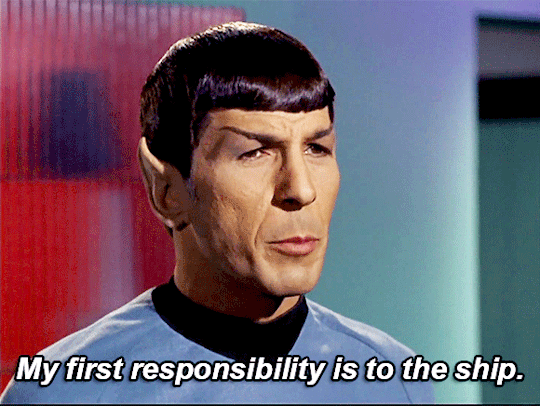
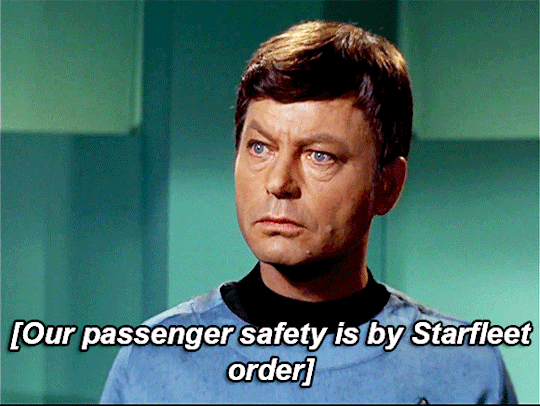
[ID: Two gifs from Star Trek: The Original Series. The first gif shows Spock in a blue Starfleet uniform. He is standing in a green room in front of a red-lit glass cupboard that has a vase inside. Spock is captioned saying "My first responsibility is to the ship." The second gif continues Spock's speech, but he is no longer visible, with the shot instead panning to the ship's Doctor (Dr. McCoy) and then to Spock's mom (Amanda). Spock's words are captioned as, "[Our passenger safety is by Starfleet order]". End ID]
Here, Spock's first defense of not going into surgery to save his father's life is over regulations. However, in previous episodes, it's clear that Spock is comfortable disobeying rules for his benefit. In The Menagerie, he commits mutiny to bring Captain Pike to Talos IV, and risks the death penalty by doing so. In The Devil in the Dark, he openly overrides Jim's orders, initially to protect an unknown species, then later to protect Jim. If Spock and Jim weren't so close, both of these instances could likely lead to criminal charges.
And yet, he gets cold feet here. Even if a regulation existed that prevented Spock from temporarily stepping down (which I highly doubt), he's not one to shy away from breaking regulations when he sees fit.
(Also, does the verbiage in that first gif sound familiar to anyone? That's almost word-for-word what he said to Leila when he was letting her down in This Side of Paradise; I half-expected him to finish with "to that man on the bridge". Perhaps that's a subtle indication of where Spock really feels his responsibility lies.)
He then gets a bit more specific, in saying he doesn't want to hand over command in such a stressful situation.
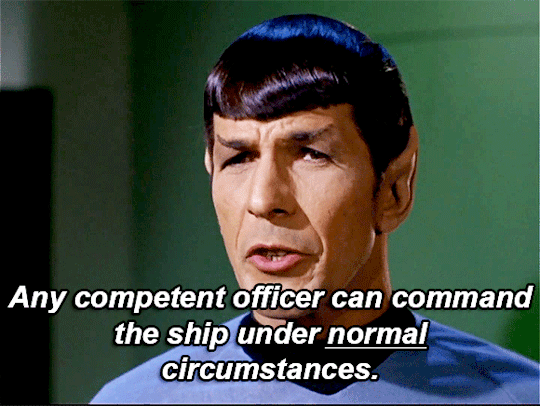
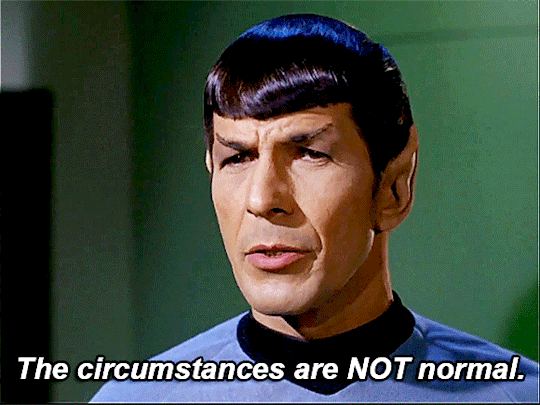
[ID: Two gifs of Spock in his room, in front of an intersection between a white and green wall. He is making eye contact with and speaking to Amanda offscreen. Over the two gifs, his words are captioned: "Any competent officer can command the ship under normal circumstances. / The circumstances are NOT normal." The word "normal" in the first gif is underlined. End ID]
Oddly, that's a completely different defense. And not a logical one, since Scotty has been at the helm in equally stressful situations, like in A Taste of Armageddon, or The Apple, for example. It would even be a reasonable argument that Scotty is better in command than Spock, considering how stressed Spock got in The Galileo Seven. Also, because Spock is in his room here, someone else who's capable of command must be at the helm already, so why don't they just stay there? As much as I hate to admit it, Amanda was right-- before she went on her racist and manipulative tirade-- in that Spock should be able to hand over command to someone else.
He also talks to his mom about Vulcan philosophies, but given how it doesn't benefit anyone to have an acting captain who's so keenly distracted, it's not a logical argument to stick with.



[ID: A set of three gifs from the same scene as above, where Spock is talking to his mother. They are standing in front of a white wall with red lighting. He paces around her such that his face is only visible in the second and third gif. Amanda's expressions are never shown to camera. He is captioned saying, "It means to adopt a philosophy, a way of life, / Which is logical and beneficial / We cannot disregard that philosophy merely for personal gain." End ID]
So, what's making Spock behave like this? I don't think his sudden inflexibility here is because he cares for Sarek less than Jim and Captain Pike. That may be true, but Spock was the one who suggested the experimental procedure, and already volunteered as a donor before Kirk got injured. It's also not to impress his dad with Vulcan stoicism, since Sarek wouldn't live to see that play out.
In answer to that question, the episode posits that Spock's distress over his dad's critical condition makes him unable to think clearly. Though, Spock wasn't contradicting himself like this until Kirk got hurt. Before Jim's injury, he was following a coherent thought and behavior pattern (as in: dad is injured -> research ways to help -> talk to the doctor about it). But afterwards, his level-headedness went out the window, to the extent that when he went into the surgery (only after being led to believe Kirk was okay), he was restless and asking for Jim, despite the fact that he should have been unconscious from medication.
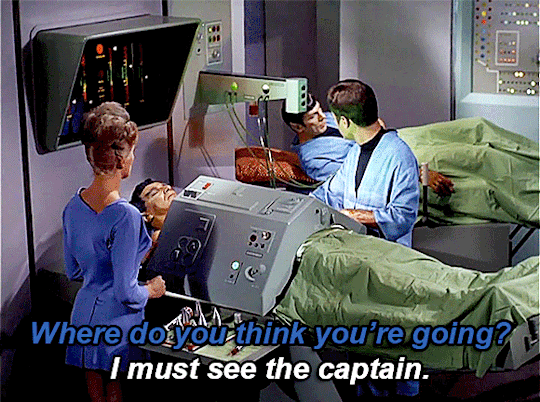
[ID: A gif of an operation from the same episode of Star Trek: The Original Series. In it, Dr. McCoy and Nurse Chapel are standing over an unconscious Sarek. He is wearing a green surgical blanket and his chest is underneath an angular grey medical device. Spock is laying in a different bed, and between them is a wall mount that connects four tubes; the two coming from Spock's side have a light green liquid, and the two going to Sarek have dark green liquid, to indicate the filtering of Vulcan blood. Spock is awake, sat up in bed, when Bones asks, "Where do you think you're going?" and Spock replies, "I must see the captain." Nurse Chapel reaches for a syringe. End ID]
I'd be willing to buy that both his dad and Jim's injuries causes Spock to be stressed out of his mind. However, the pacing of the episode shows that it's Jim's less severe stab wound that pushes him over the edge, to the point where he's forgetting things and not able to justify himself. I even believe Spock thought his actions were logical, he just lacked the self-awareness to realize he was incapacitated.
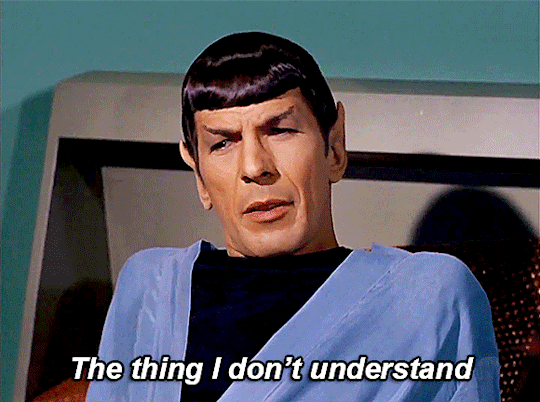

[ID: A set of two gifs, where Spock is lying upright in a sick patient bed. He's wearing an outpatient robe, and behind him is a red pillow and grey metallic headboard. Spock is staring at the floor until partway through the second gif, until he looks up to make eye contact with Kirk offscreen. Over the two gifs, his words are captioned: "The thing I don't understand / Is why I didn't think of it earlier." End ID]
I don't have a good conclusion here, other than that his actions make no sense unless he was worried sick (about Jim, specifically), which destroyed his rationality, objectiveness, and reverted him to Vulcan emotional barriers in a situation where it's illogical to have them. It's baffling to me that no one in the episode questioned Spock's logic, since his sudden adherence to rules is inconsistent with how he behaves normally, but it does fit in with his tendency to get agitated when Jim is injured.
#I don't know if anyone wanted an ungodly long post about this but#Spock's decisions bothered me a bit because on the surface level they make sense#but then if you think about it further it doesn't#so then you have to think about it even more to justify his character motivations#and I may not be looking but I haven't seen anyone try#also this took so much effort that at some point I just have to let it go akjsdfhlkdsjh#journey to babel#tracking tag#rambling#spirk#k/s#star trek tos#long post#<- I don't think it's that bad if you don't include image descriptions but still
74 notes
·
View notes
Text
Mirage’s story trailer: analysing the narrative
Originally posted here. This is part of a series of posts/essays I’m importing over from Reddit to Tumblr, because I like them and I want to sort them so they don’t get lost in my general comment history.
General housecleaning preamble:
This was written in the 24 hours after the drop of Mirage’s story trailer on 12 June, 2023, in response to a whole lot of crap posted specifically on the subreddit and Twitter about “the story won’t be good because it’s just pandering to the old fans”. Which I don’t believe. I’ve used my narrative analysis skills to break down the trailer and have a stab at what might happen, and the TL;DR of this is, I think we’re in good hands. The impression I’m getting on the story from this two minute trailer is that we might be in for the best AC story in a good long while.
But I also want to emphasise a couple of things.
Firstly, all of this is just a guess as to what’s in store based on the information solely given in the trailer. At the point of writing this, I hadn’t seen any other information released by Ubi (and I honestly still haven’t paid much attention to it). So although my attitude towards Mirage’s story is pretty positive based off the trailer, it doesn’t guarantee that the final product will actually be good, because as we’ve known for years, Ubi are masters at the marketing game. Secondly, as was pointed out in one of the comments I recieved on the post, this breakdown doesn’t take into account acting and delivery a whole bunch. So even if my story guesses are solid and turn out to be in the right direction, if not nailing it on the head, the presentation of said drama can be ruined thorugh things like AI cutscenes, poor voice direction, etc., which the previous RPG titles are notorious for. Because I approached this breakdown as a novelist where you don’t need to worry about this stuff lol
And now, onto the post.
At first I was going to only talk about Mirage's story trailer and why it’s promising, actually, but then it spiralled into a big thing about AC’s narratives as a whole: An Analysis (Reddit post, 13 June, 2023)
Hi. Maybe you’ll remember me from hit posts like Assassin’s Creed isn't about Order vs. Chaos, or that one time I wrote a 165k book about Connor and Arno vs. Shay. Point is, I write a lot about Assassin’s Creed and its narrative, and I’m here to write more about it now that we have more information on Mirage’s story and why I think, despite so much negativity towards it, we’re going to be just fine, actually, and how we could be in for the most interesting Creed-story in a decade.
Buckle up, this is a long ‘un.
For years, we, as an online community across multiple platforms, have been talking about how “AC isn’t AC anymore”, and one of the topics that gets brought up repeatedly is the story. The narrative isn’t as good anymore; I want them to talk about the philosophy of the Creed just like they did in AC1; I want interesting characters who are themselves instead of these ‘choose your own adventure’ RPG games; etc. And it looks like, with the new drop of Mirage’s story trailer, we have what has been asked for.
Yet sadly, but unsurprisingly, I’ve seen many complaints across social media following the trailer drop saying that what we have been presented on the narrative is crap. It’s nostalgia bait. It’s just trying to trick us again. To which I say, “Huh?”
Look, I get it. I get that many people have been so burnt by the series that this response is akin to an automatic reflex to protect yourself from disappointment. I get the cynicism people are feeling because the last game’s marketing was focused on “returning to the roots” and it did not meet expectations. I get it because people want to go to the timeline where we have a game that is a direct improvement on Unity, or pulls more from Ghost of Tsushima. I get it. I have been there. I understand. I’m here to try and assure you that we seem to be in good hands for the story, at least.
I’m not going to talk about the gameplay (aside: Assassin Focus is friggin’ sick, nor is it a magic teleport à la Odyssey), or the graphics, or world design, or anything else. I’m going to leave that to people who are smarter than me in those areas, but narrative is what I’m smart in. So, let’s have a look together.
We’re going to be talking spoilers from here on out, but getting into detail about endgame Valhalla spoilers in relation to Mirage, which I will mark if you would like to remain unspoiled for that. Also, we’re going to be doing a lot of groundwork first before getting into the actual analysis of the trailer, because I need it to properly talk about the trailer in the context of the wider franchise. Thanks for your patience. I promise that, if not interesting, it’ll be worthwhile (high-five to fellow narrative nerds).
Okay!
First, we’ll go briefly back to the beginning of the series and so the game that started this giant love affair. AC1, and the Creed. I want to start here because the heart of the trailer is about Basim’s relationship to the Creed (which for now, we’ll just say is complex, further supported by what we know about him from Valhalla), and it also touches on what we the audience want and expect from explorations of the Creed, and why those expectations might not be the best approach to story.
There’s a gorgeous article I often point people towards regarding audience reception to Star Wars, written by the incredibly empathetic and smart Film Crit Hulk. The Beautiful, Ugly, and Possessive Hearts of Star Wars. Though I highly recommend reading this article, the reason I’m bringing it up now is that, in summary, it makes a deeply resonating point: we care so much for the things we love because of the way they spoke to us when we first fell in love with them. For Star Wars, it got many of us as children. Watching A New Hope for the first time might have imparted your love for Luke as a heroic Jedi Knight with his lightsabre, or the overwhelming arc of good vs. evil in the Rebels vs. the Empire, or it might be for the resonate message of hope, etc. Hulk calls this “the Core”, and the idea behind this is, it’s what drives the love for Star Wars in each individual. It’s the thing that captured your imagination about it above all else, and when that “Core” is challenged or damaged, then it makes people furious. It’s why there was such split reactions towards The Last Jedi. It’s why we’re currently in a Renaissance for the Prequel Trilogy, and why I’m expecting in ten years to see a similar resurgence of love for the Sequel Trilogy. And something similar has happened with Assassin’s Creed. We all love it for different reasons, be it its roots in historical adventure fiction, its particular flavour of a hyper-competent killer (and the and/or nature of sneak vs. battle master, which is more commonly divided by the fandom into stealth vs. combat), its gameplay functions (“classic” vs. RPG) … you see where this is going. We all have our own “Core” for AC, and Ubisoft has not been able to reconcile what I call the “classic Core” fans and the “RPG Core” fans.
Why are we talking about this again? Oh yeah, we were talking about the Creed in AC1 and how that relates to Mirage.
AC1’s focus on the Creed is praised by some to be thought provoking and driving Altaïr’s development, which is all true, but I feel many people get wrong as to why this works as it does, and ignore that for many, it did not work. See all the jokes about making Altaïr spin in circles in Al Mualim’s office as they’re waiting for him to shut up. So, in the second last bit of introduction for this essay, I want to briefly discuss character vs. plot writing.
Plot writing is where the story is being driven forward by the demands of plot. “Oh no! We have to stop the bomb from blowing the city up, and every action we shall be taking shall be focused on doing that!” The Avengers movies are good examples of this.
Character writing is when the decisions made by the characters are driving the plot. “Jane is hiding secrets from me, and so I’ll react in response to that.” This results in more drama-driven stories; stories about characters doing things because of other characters. This is stuff like Arcane (especially Arcane; my God that show is built like a Swiss clock) and House of the Dragon.
Then you have media which is a mix of both. Things like Into the Spiderverse (another Swiss clock uunf) is a mix. Miles and Peter have to go to Alchemax to steal the information on how to shut down the collider (a plot driven need, because Miles, trying to master his spider powers, has accidentally broken the USB that 1610 Peter Parker acquired to shut down the collider), but the heist goes horribly wrong because Miles is trying to help 616B Peter with Kingpin’s unexpected arrival but, again, doesn’t know how to use his powers (a character driven development).
There is not one formula that is better than the other. Different story techniques are different tools, much like how you’re not going to use a saw to hammer nails into wood. And we’ve had both kinds of writing in Assassin’s Creed before that work really well! AC2 is primarily plot-driven, Unity is primarily character driven, and AC3 is a mix of both. But Mirage’s story trailer is tickling all the right areas in my brain for a character story. We’ve established that the main conflict is within Basim’s relationship to the Creed, how it demands his unflinching loyalty to the hierarchy of the Brotherhood and yet preaches freedom at the same time.
I think people focus so specifically on “we want a good game talking about the philosophy of the Creed” because that goes back to their “Core”. It made me think, it made me care about Altaïr as a character, it made me invested in what was going on in the story. And this is great! But you also have to recognise that if you talk about just philosophy, it has the danger of steering straight into almost unwatchable/unretainable territory. Think of the scene in the second Matrix movie where Neo, Trinity, and Morpheus go to talk to the Merovingian at the restaurant. Most of that conversation was all about philosophy (causality, for those who would like the reminder), and most people found it boring to watch and didn’t remember most of it even directly after it was done. When you rewatch the scene, or you write out the dialogue and take time to analyse it, it’s really interesting! It’s thought provoking! But it’s not a good watching experience. What most people came away with from that scene was, “Did he just give that woman an orgasm via spiking her cake?” So how do you fix this? You dramatise it. And the AC1 team were successfully able to dramatise the philosophy in AC1 that it captured enough people’s imaginations to go on and spawn the other philosophical parts of AC later. Ezio’s actions in Revelations. Haytham’s conflict with Connor in AC3. Shay’s torn loyalties between duty and what is morally right in Rogue. The conflict between Arno and Germain (once you get through the … lack of presented information) in Unity.
You can argue that the philosophy about the Creed has eaten itself to nothing in the last few games. That there’s nothing left to tell after fifteen years of the same damn thing. But I disagree.
The way to make the philosophy interesting isn’t to discuss the Creed as a concept of itself, which I see a lot of these requests asking for. We’d have wrung ourselves dry of that years ago if we did that. So, how do you fix that? How do you make it interesting whilst continuing to make a video game that is financially successful? You make it about character relationships to the Creed. On a narrative level, those possibilities are endless.
And Basim’s faceted relationship to the Creed looks to be shaping up as character and philosophy coming to mix. Which leads us finally to the last bit of groundwork to get into before the trailer stuff: Basim himself.
Valhalla spoilers below.
When we’re first introduced to Basim, all seems well on the surface. He’s a powerful figure in the Brotherhood, both as an experienced killer, a worldly traveller, and a teacher. Yet there’s something off about him; maybe it’s the lingering camera shots where he’s just standing a bit too off-puttingly. For someone so high up in the Brotherhood, he too seems awfully callous about Eivor having the Order’s secrets whilst not being a member, an attitude directly contrasted to Hytham who objects to Eivor’s schooling after just having met her. Basim’s also very closed about why he and Hytham have come to Norway. Basim talks big about how they’ve come to hunt down members of the Order of Ancients, but there’s certainly a sense he’s hiding information. That his friendship with Sigurd isn’t all that it seems, and that there’s a deeper arrangement going on that we are unaware of.
That arrangement, of course, being that Basim tries to help Sigurd unlock his godhood. Again, there’s a sense that Basim is hiding something. Why would he do this? And Eivor pushes back on it, but she’s helpless as she watches Basim and Sigurd go down the path of madness together, putting not just themselves at risk, but the clan, too.
At the end of the game, the truth comes out. Basim was using Sigurd to get to Odin, who he did not realise was reborn as Eivor until the climax. Why? Basim is the reincarnation of another Norse god, Loki, blood brother to Odin. And Odin imprisoned Loki’s son Fenrir for fear of prophecy. Now Loki-become-Basim wants revenge.
Basim in Valhalla is a man who has gone beyond being tied to the Creed and will only have it in his mouth and wear it as it suits him. He is unshackled, so to speak. He is his own agent, and we’ve had to take the entire game to notice that that was what was off about him when we first met. And one of the questions we should get answers to in Mirage was how he became the way he is.
End Valhalla spoilers.
Mirage takes us back twenty years before the start of Valhalla to a younger Basim. A street thief who is suffering from hallucinations and nightmares of a “djinn” that he alone endures. On a surface pass of this, I think it looks great. The trailer has a clear narrative throughline of Basim being saved by the Hidden Ones and joining them, but soon finding out that what was sweet at first bite, a promise of freedom, has turned somewhat sour. Basim is made by other characters throughout the trailer to question both his place in the Brotherhood, what they’re doing, and what he is, a question that cannot leave him alone as he continues to be haunted by his visions.
This throughline is fascinating to look at. You have a strong premise and strong conflict, and you can start to piece together the shape of what the story is going to be about. You know how I said before the trailer gives me a strong impression that this will be a character-driven narrative? Let’s dive into that. And we’ll talk about the Creed at the same time.
What I think looks strong narratively about this is you should be able to play Mirage without knowing how Basim’s story goes in Valhalla (there is another marked section of Valhalla spoilers later, but otherwise I’ll only be talking about the content of the trailer). This is because the narrative looks contained. We’re not introduced to Basim as a “you already know who this is because it’s a prequel!” character, but instead as a new character. He is a street thief, and he sucks at it because he’s just been caught by two guards and is about to be punished by them. But then! Shock and surprise! Basim is saved by a powerful warrior. She grabs him and tells him to follow her, we have to go! Basim has no choice but to do so as she clears an escape route without trouble. She leads him up to a leap of faith spot and gracefully jumps.
Basim, on the other hand, is clumsy and doesn’t know how to do a leap of faith. Off he falls into the river below. I actually went “Ouch!” upon watching the trailer for the first time because he lands in the water on his back. Painful! And not only does it lead into a classic shot of a person being swallowed by black waters, but it’s so perfect an illustration of a character who isn’t competent in the world they're about to enter, and, of course, what that world will turn them into soon.
It can also be symbolically read as death and rebirth.
After Basim has been dragged out of the water, we then cut to a campfire and have talk of the feather ritual. I was kind of shocked to see people reacting negatively to the inclusion of this. The most common criticism I’ve seen of this scene (this isn’t including the AI animated cutscenes or what have you) is that it’s nostalgia bait! It’s one of those pieces of marketing that is trying to trick you into buying this game! I think this take is the culmination of Internet-flavoured cynicism. Maybe these critics are right and marketing is part of the reason why this scene was included in the trailer, but narratively, this scene is excellent because it starts to put down the base of where Basim’s psychology starts. After Basim, obviously by himself, has been rescued by Roshan, this cut establishes camaraderie between members of the Brotherhood. A sense of community and belonging, which is something that Basim is painfully lacking. But the other thing it does is offers Basim purpose. If he can join this Brotherhood with its close connections and rituals, and if it gives him the power to save other powerless people like Roshan saved him (not only from death, but from a life of oppression and/or scratching by), then it is an opportunity to find himself, to be part of something greater.
Because the “job” of the first part of this trailer is to mythologise the Hidden Ones in Basim’s eyes and show his radicalisation to the Creed. It’s getting him to care so much about this that he pledges himself to the Hidden Ones and to put him in a position where, once he emerges from the bubble that is Alamut, the world starts chafing against his ideals when it doesn’t offer the simple existence presented at Alamut.
Radicalisation to the cause is actually what a lot of the other Assassin stories have been about. It’s Altaïr’s story, it’s Ezio's, it’s Edward’s. Arno suffers consequences for not being radicalised to the cause (expulsion from the Brotherhood for one). And for the reverse, Shay’s story is about his slow conversion from an Assassin, to a wayward lone wolf, to a Templar. It’s about why should these people take up these causes and devote their lives to something that won’t be remembered in the history books, and why they choose to become one of endless, lashing waves throwing themselves against the breakwall.
And Basim’s radicalisation is further cemented in the trailer by Roshan directing him to strike down the Order of Ancients. “The Order has held dominion over man and their empires for centuries,” she says as she hands Basim a feather. Go forth and kill.
Something that I’ve always wanted to see in an AC game is a character’s reaction to the first time they kill someone. From the top of my head, there are two times we’ve seen this talked about in the franchise, and one of them I don’t really count. The first is Shay’s reactions to killing his Templar targets at the beginning of Rogue. He isn’t happy about it, and it’s the first crack set that ends up with his defection. But this is the one I don’t count because Shay’s issue isn’t so much with the act of killing, but with the why behind the killing. The second time is in the novelisation of AC2, when Ezio kills the city guards who come to arrest him just after he’s claimed his father’s arms and armour. Ezio is completely shell shocked when this happens. He’s just killed someone. Oh my God, he’s killed someone. That has an impact. Taking a life is no small thing, and I would like to see the weight of that addressed for once in this franchise. And I do wonder, given the theme of this trailer, if we’ll finally have this. I hope so, because it seems that it’ll tie perfectly to Basim’s arc.
Because the arc is heading in a direction that only Rogue has really touched on. That being the crash from the high. What happens when you’re no longer a believer? What happens when you look back down the path of your life and reflect on the things that you’ve done … and you’re not sure of it?
What if you’ve got buyer’s remorse for this Creed?
You want AC philosophy? Well, here you go.
The trailer then cuts to a voiceover that introduces the main character conflict on the Brotherhood’s side. “Swallow your questions. Serve without complaint,” a woman says. Her name is Nehal, and she’s Basim’s childhood street rate friend. As such, they’re close to each other. Nehal’s talking about his relationship with Roshan and seems to be ranting to him about how Roshan treats him. Maybe Basim has been venting his frustrations about his teacher to her, and this woman is trying to help him. But there are two main points here that are important – Basim is having second thoughts about the Brotherhood, he’s frustrated with them (it’s unclear at this point if he has brought this frustrations up with Roshan yet), and secondly, his relationship with Nehal is important. They’re in each other’s corners, and it might feed more conflict into Basim and Roshan.
The trailer then goes further into establishing the conflict between Basim and the Hidden Ones. “Everything you do serves the Hidden Ones. That is a strange kind of freedom.” This is said by another important character, Ali. There is tension there. Basim is obviously having doubts about his role in the Brotherhood, and it’s not helped by other people feeding into it.
This conflict of interest is further hammered on with the rawest line in the trailer. “You are not the first to walk the shadows broken. Pour your pain into the Brotherhood.” On this note: Acting! I love Basim’s expression. Honestly, he has lots of good micro-expressions in this trailer, and I adore it. In this shot-reverse-shot, you have this deep anger and frustration in him that’s barely being held back. And this frustration is so compelling because it screams to me that Basim is trying to communicate with his teacher, perhaps by telling her about the djinn, perhaps by sharing his doubts with her about things that have happened either in the plot or his street rat backstory, but he’s being rebuffed. He is not finding help here. He is still alone. That’s going to pour more fuel onto the fire for certain. Because the other emotion I read in his body language here is this painful acknowledgement that he is not going to get the help, nor the understanding from Roshan that he needs. Because pour your pain into the Brotherhood sounds an awful lot like a deflection after she and Basim have had a fight about personal torments plaguing him.
And the tragic thing is: this is good advice for a lot of people who come to the Hidden Ones. They are made up of people who have been hurt by the imbalances of society, and that is a rage you can direct back towards helpful sources. But it’s not good advice for Basim, much like Yoda saying to Anakin, “Just turn off your emotions lol,” was terrible advice.
Oooh the drama’s cooking.
Almost to the end of the trailer!
“We are messengers of justice, and not the final judges.” I’m going to have to think more on this, as I’m not sure how it relates to the trailer’s narrative throughline here right now, but I shall think on it. For now, I would say this is a calming line, a way to cool the heat the rest of the trailer has built up between Basim and the Brotherhood. We talked about radicalisation before, and this might be here to remind Basim that he needs to sit and calm down a moment before doing something stupid he’ll regret. What that might be, I’m not sure, but it might be taking action against the Brotherhood. Just a little treason.
And finally, to round this out, we come to the djinn. My God I’m so excited to see what happens with this, Ubi don’t let me down.
I talked before how I don’t think this is a Rogue situation where this questioning of the Creed is coming from Basim having moral thoughts about killing people. I think it comes from his conflict with the djinn. “He knows not what he is.”
The djinn is so interesting. I want to take a stab in the dark here about what the djinn’s narrative purpose here is as a devil on the shoulder, but I think it ties into Basim’s relationship with the Brotherhood. Basim is haunted by this terrifying shadow demon only he can see, and I’m sure if someone as powerful and confident as Roshan and the Hidden Ones came into your life talking about freedom, Basim might see it as a chance to finally escape this horrible thing in his head. To get away from the nightmares that he, tragically, has no chance of escaping. And the Creed can’t help him with that.
Valhalla spoilers once again.
In fact, the Hidden One’s work might only make the problem worse because it has been established in Valhalla that the consciousness of the reincarnated Precursors are brought about when their previous lives and their current lives come closer to each other. This was why Tyr awakened in Sigurd when Fulke cut off his arm. This is why Odin started to awaken in Eivor the more she stepped into a leadership role. And this same pattern starts awakening in Basim’s life earlier than Eivor and Sigurd’s did. Because Basim is a thief, he is a rogue, and as he becomes a Hidden One, he becomes a killer, all of which feeds into the bursting dam that is Loki’s life.
In light of this, I’m expecting that the problem of the djinn will only become worse the further we go on in the game, that we’ll be seeing it more and more until Basim is so far pulled down by it he might go to it to try and escape (“He in his madness prays for storms, and dreams that storms will bring him peace.”). Because it might end up being Roshan who is the final straw on the camel’s back. Not through any fault of her own, but because her leadership, her existence as Mentor, caps the concept of “freedom” the Hidden Ones represent. Basim can never be truly free if Roshan is there. Just like Loki could never truly be free until Odin was gone (remember from earlier, Basim is challenged by Ali asking about his “strange kind of freedom”. Freedom seems to be a massive theme of this story).
Mirage has been described by its devs as “a story of tragedy and madness”. What better way to do that than this?
End Valhalla spoilers.
“Have you not wondered at your nature?” I like how this cuts into the menacing shadowed-face shot as Basim rises, a hooded killer. Good silhouetting with the beaked hood as well! Woo! And if you’re not yet convinced about Basim’s wavering on the Creed, how much the djinn will be affecting his arc and his choices, the trailer song, How Villains Are Made by Madalen Duke, is practically screaming this theme aloud. Just look at the lyrics!
And that’s what I’ve got to say about the trailer, about AC’s narrative direction as a whole, and, for the first time in years, why I think we’ve got some good reasons to get excited about an AC story. It seems character driven, full of juicy, interpersonal conflict, and is the story of a young man who goes from a scrawny dude getting his arse kicked, to a powerful Hidden One, to someone who’s had the light beaten out of them by life, his fracturing mind, and deeply tragic circumstance. Some other bonus things from the trailer I would like to know about:
0:57, the silhouettes behind Basim in the White Room. Who are they? Also, the White Rooms once again looking awesome.
2:00, there’s a guy who comes out from behind the pulpit speaker. He seems to be Basim’s target here, as Basim only engages the hidden blade once this guy comes into view. I wonder if he’s an important target.
2:07, Basim and Nehal seem to be fleeing from Ali. Is this part of the story's conflict? Or is it only trailer editing?
2:09, a merchant looking guy backhands street thief Basim. This might be a representation of the “inciting incident” that landed Basim in his position at the beginning of the trailer. Note that how Roshan saves him in the announcement trailer vs. the story trailer take place in different locations. Same thing might be here for Basim stealing from others. (The room’s blue and orange lighting too is gorgeous.) I think that we see the djinn directly after this might be the first djinn cutscene in the game, based on Basim’s outfit.
The other thing that gives me hope that we could get this great story too is the game length. The devs have said the narrative will be about 15-20 hours, which is a fantastic length of time to explore a drama like is being promised in the trailer.
And, on top of that, if it’s relatively fun to play? I’m game.
7 notes
·
View notes
Note
Hi i just wanna say i have read and loved your analysis for trigun/tristamp/vash/wolfwood etc! I came scross with them when i finished tristamp and slowly was reading the manga however i felt a very weird feeling when s1 ended and tried to see if it was only me or there were more out there. I am sorry if this comes out of nowhere its just that i have no one to talk about this :/// and the few people who watched tristamp they have not read the manga or care as much.
I love tristamp very much as a product, i think they did marvellous but the one aspect that made me just not be completely insane is how much they have changed the relationships. I feel the way they upped Knives and Vash and seems completely sided other characters felt like a disservice when i think about it, almost like fanfiction. I feel weird thinking about it this way because i do think and i have seen how much love and passion they put into the project but i just feel at this point s2 wont be able to set up the other relationships anymore.
The one i am the most sad about is Vashwood, shipping aside i feel their relationship is as detrimental to Trigun as Vash and Knives. And it just feel tristamp wrote themselves into a corner with them. And to be honest too, i just feel WW entire arc will be different now, so a whole diff character. It pains me 😢
I think tristamp did great making an argument for how knives is how he is and making him a great antagonist very grey scale but being so short i have already seen people completely disregarding Vash’s philosophy and actions are useless or stupid. I understand it comes from just watching the series but wow, idk i feel it can totally backfired on the long run.
Sorry for bothering you 🙏
Hey!! So sorry this is very late response haha, lifes been quite busy. Also you really have zero need to apologize, I always enjoy engaging with others, so actually thank you for the ask! Even if it takes me forever to do so... 😅 This ended up being pretty long, LOL, so it's beneath a readmore...
As for your comments about how tristamp has changed the relationships of the characters... I have to agree from what I've seen that it really makes me feel like the way they are setting it up will be detrimental, as you've put it, to the original arcs. There's a lot that's been changed, especially character wise (some of which I've delved into for Wolfwood and Vash in my previous opinion piece), which rubs me the wrong way. I know that it's technically supposed to be a prequel but theyve also shuffled some very important and heavy hitting trimax scenes into the prequel, which lacks the ooomph and build up to the scenes that occurs in the manga, and makes me question what they are going to do in the long run to replace those scenes.
Also on a more personal note, I really dislike pregnancy horror, especially pregnancy horror as a result of SA, which stampede has heavily leaned into... and which didn't feature at all in the manga. Indeed, there very much heavy discourse on bodily autonomy and sexual assault within the manga; but there isn't specifically pregnancy horror at all in the manga. The only thing related to the manga that does indeed have plant pregnancy related stuff is one of the guest comics in Trigun multiple bullets, which is HUGELY sexualized, and it's connotations with that then make me very wary to see it pop up in tristamp. Overall it feels a bit off and jarring to suddenly have it be centre stage as a theme/conflict, even if the theme behind it of bodily autonomy is the same. Honestly, it feels a bit sensationalist to me as if it's almost used as an attention grab of look at this doesn't it make you uncomfortable? And seeing how some of the other things in the show have shifted to be more sensationalist and very clear and open about themes/actions of characters (very contrary to Nightows style of writing, which tends to keep things grey and nebulous and slow burn-y, which I personally very much enjoy, because I like having to draw parallels rather then having thing spelled out for me) makes me wonder if they are doing a similar thing with that, and trying to be more overt about the themes of bodily autonomy and chose to do that via pregnancy horror. Or maybe someone in the team just had a pregnancy fetish... Anyhow, I've digressed from what you were talking about entirely, oops...
As you've put it about how some of the relationships feel like fanfiction, as I've put in the post I've linked above, I very much feel like they are trying to lean into a wide audience... Which means a more canon hetship as is seen with Meryl taking on some of Wolfwoods actions and literal lines from trimax for a Vash x Meryl relationship, while removing more obvious queer representation (or other things that may be considered 'unfit' for a larger audience, such as the removal of Razlo and making Livio just brainwashed so far...). As a result, I'm pretty sure Wolfwood will play a more minor role than he did in trimax, his relationship with Vash going to be not as deep. Personally, I'm unsure also at how they're going to go about the whole 'Wolfwood fully accepting Vash and loving him to the point of literally sacrificing his life and everything he's worked for to save Vash, fufilling Vash's disagreement with Knives on wether humans will truly fully accept plants', something that's pivotal to one of the underlying the themes and also making the story unequivocally queer in nature (since this is usually something a heterosexual love interest would fufill) even if Nightow didn't mean it to be. I feel Meryl might instead step in to fill that position instead, and while Wolfwood still has a somewhat deep relationship with Vash, it's going to be more shallow, which would be very disappointing (for me at least). It'll be interesting to see if they, like in 98, go for millywood as well for more hetships that can draw in the audience. In the meantime, the more canon queer rep is removed, and is instead very much relegated to subtext, such as Elendira being a literal child... but also including leaning into a queer subtext for garnering an audience that is interested in queer ships. And even twisting some characters motivations a little to lean into queer subtext to garner the queer section of a larger audience... Which includes Knives new 'I've done everything for you' in regards to Vash, which he doesn't say in trimax, and actually fully attempts to kill Vash in response of Vash standing in the way of his goal, even if he also has difficulty with his decision (very different!).
On the subject of Knives, I'd say that he's maybe got a bit better of a sympathetic goal within tristamp but I'd still say compared to trimax, I personally think it's still not particularly well written. I'm saying this specifically as they make stamp!Knives always detached from humans when in fact in trimax he very clearly has high hopes for being accepted by humans and even cries when Conrad accepts them when he was young and pre-Tesla. This allows him to be a much more fleshed out character then in either of the animes, since you understand that he's very much motivated by fear and stuck in the fear reaction of rejection of humans. It's possible we will get a more nuanced background in the new season, but considering that they've already set the story in that manner I don't have high hopes for it, but I also tend to be negative, haha.
At the same time, I'm very much in the same boat as you; it's incredible to see the love and effort put into the show, and makes me excited about it... But that excitement pales in comparison to the way they feel like they've hamfisted the characters a bit, and my own questioning on how they are going to continue the show, and how they've shifted some of the themes around. I've also seen/heard of other people deriding Vash for his beliefs, and I think the way they have set up the themes and make Vash feel a lot younger and inexperienced lends to that perception by people, which is... well, big yikes if a good portion of your audience is missing the themes. Hopefully moving forward this is remedied but I again doubt that. I know they were trying for a prequel so the way the handled the themes and want the character to 'grow' is part of that, but at the same time... there is no issues with the original character arcs for the characters within Trimax, and 98 barely scraped the lore that's available in trimax due to the majority of trimax not existing, so I don't really understand why they really decided to go for a completely new retelling (well, I do, but still...). Again, I'm absolutely happy to see that trigun is back and, hell I've gotten re-into trigun and actually read trimax this round, and it's lovely to see that the animators are putting in a lot of love and thought into tristamp... but at the same time feel like there's lots of issues with the themes and characterizations, and I honestly doubt that it'll be fixed moving forward, so you're not alone with that, and I've talked to multiple other people who have the same qualms about tristamp!
#huginspeaks#trigun#tristamp negativity#opinion piece#hugin speaks#hugin rambles#SA mention#pregnancy horror mention#vashwood discussion#tristamp discussion
8 notes
·
View notes
Text
TKB meta 2.0
Reflecting on my previous TKB meta, I feel like I phrased a lot of it poorly (both in terms of syntax and in terms of communicating what I intended to say), but I still think this is an element of TKB's character that often gets overlooked and I'd like to talk about it some more.
Like the post about Maat that I reblogged points out, TKB's central philosophy, which he explains to Atemu and co in Vol 32, is basically moral relativity. On a basic level, he's critiquing Atemu and the monarchy or claiming the moral high ground over him when they themselves are responsible for the creation of the Sennen Items and – of course – the Kul Elna massacre which made that possible.
In this scene, TKB is explaining why Diabound – his Ka – is a "God-type" rather than a "demon-type" to the priests, who are all shocked that someone who they perceive to be evil would be able to produce the Ka-type associate with 'goodness,' and by the Scale's failure to judge Bakura as evil. Prior to this particular panel, his thoughts have revealed to the reader a few things, namely – 1) the Sennen Items aren't holy items of good as they've been described by Akhenaden, 2) there's a shadow power lurking within them, and 3) TKB wants to obtain that power and use it for himself, to achieve his stated goal of getting revenge.
In the original manga, what TKB says here is 悪って何だ?てめえの正義に忠実ならそいつは善ってことになるんじゃねえのか… which basically corresponds to the official translation. In the simplest of possible terms, it essentially means, "If someone is loyal to your justice, then does that make them good?" The official translation expands upon this a little bit and emphasises the sarcastic undertone to what he's saying – obviously, TKB isn't legitimately asking if being faithful (another potential translation of the word 忠実, alongside devoted) to what the monarchy considers to be just makes him metaphysically good. Remember, this is relating back to him explaining why he has a God-type Ka and not a Demon-type, so the "good" he's talking about is very specifically the good vs. evil the priests were discussing previously. He elaborates on this at length later on.
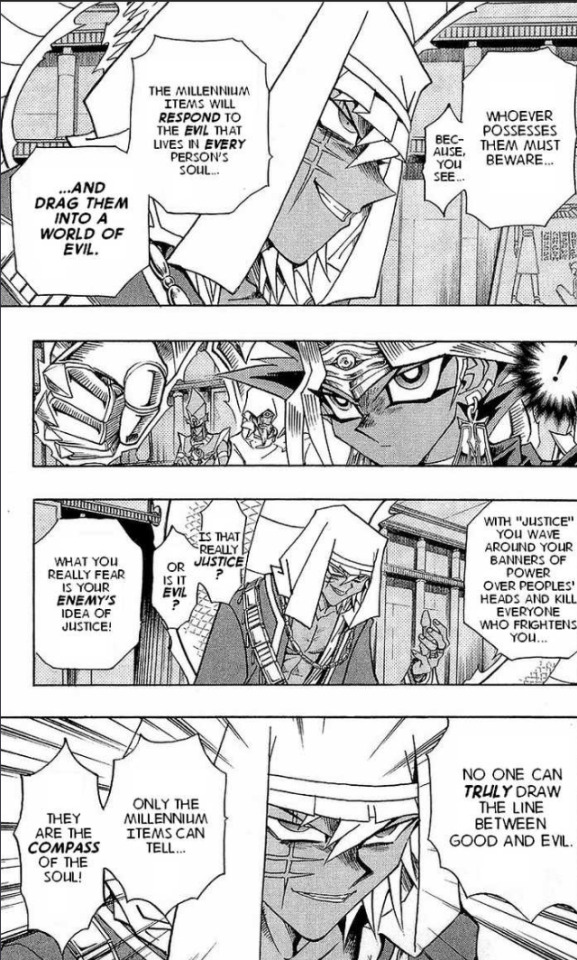
Like I said in my first analysis, what Bakura is saying here is that objective justice among men doesn't exist. As many others have pointed out, he's arguing that the monarchy has no ground to stand on to call him evil when they themselves have carried out egregious crimes against his village for the sake of the Items. And yes, he's totally correct about that.
But, hold on, Bakura – if there is no objective morality, then how can the Sennen Items make that calculation? Personally, I would argue, as I did earlier, that it's the strength of the convictions rather than the convictions themselves that are important here. If the Sennen Items are the product of both immense good and immense evil, and that's a dichotomy that metaphysically exists, then they must be operating relatively – that is, they determine "goodness" or "evilness" based on what the holder themselves believes, which makes sense given what we've seen earlier in the series. This would mean that the stronger the user's conviction is, the stronger their Ka becomes. In a way, then, the Items are themselves microcosms of the system Bakura is critiquing.
Here lies the issue for me, though – Bakura's main aim is revenge, and not revolution. He's not a liberator (he actively causes civilians harm solely to lure Atemu out), nor is he seeking to effect any positive change, since after he exacts his revenge his plan is to become Pharaoh himself and, with the aid of the Items, rule the world. I still hold that even though Bakura thinks the monarchy is wrong, he doesn't think he's right, either, even though he mocks the priests with that claim – it's just that he knows what he wants and he knows who he has to kill to get it. "No honour among thieves" is a phrase that comes to mind when I think about it; because he believes there is no real determinable divide between "good" and "evil," he'll do whatever it takes to achieve his goal – a goal that serves him and only him.
I think that makes him a fascinating character, and speaks to the complicated moral inquests this arc makes. But I don't think that Bakura's moral relativity makes him "right." Justified, yes, but right...not so much.
33 notes
·
View notes
Text
10 books to know you better, tagged by @tharkuun , thank you!!! <3
So I tried to pick not just faves, but actually some that feel like they'd tell you shit about me which.. yikes. Anyway. In no particular order and with many tears over having been made to choose:
Terry Pratchett - Mort
It's kind of painful having to choose one (1) Pratchett book but Mort was the first one that really grabbed me, and I'm also just. Incredibly fond of personifications (in the loosest sense) of Death, so this one it is.
Richard Siken - Crush
Yeah yeah, every gay tumblr user, but Siken's control over language is simply insane to me and his poetry makes me want to skip town in the middle of the night, develop some fancy drug addiction, and write until all the words are gone from my brain.
Virginia Woolf - Orlando
I'm a classics bitch at heart and I love reading classics and all, but Orlando just. Idk. Did something to me, hard to explain in two sentences, but I think it actually makes up like, 10% of my soul so. yeah
C. S. Pacat - Captive Prince
I'm counting a series as one sue me. I do love these books for themselves but I've also read them at a time where they just.. hit the right spot in terms of influence on my writing, I guess? You can definitely see it in a lotttt of my stuff if you know what to look for - not so much explicitly, but in the worldbuilding and the abstract stylistics it's absolutely there.
Madeline Miller - Circe
* Insert Jo March gif * I just think that women. I also just think that Madeline Miller's writing and yeah, tsoa is great and all, but in my humble opinion Circe is better.
Jane Austen - Persuasion
I love all of Austen's work but I think Persuasion is like, at least 50% responsible for me going absolutely feral over the breaking up & making up trope, as well as my pickiness over it (make them work for the reconciliation I want them and myself to suffer), so. I just love this book. So much.
Markus Zusak - The Book Thief
I'm generally a fan of historical fiction but I don't think anything has ever touched me as much as this one. See personifications of Death... uh yeah. 100/10 can recommend.
Albert Camus - The Rebel
Okay yeah it feels pretentious as all fuck to put like, non-fiction that isn't even poetry on here but then I'm a non-fiction bitch so what can you do. I love Camus, and I read The Rebel at a really formative time of my life and it's like, 75% responsible for me starting to study philosophy. Which, I mean, it didn't really work out but that's really less about philosophy and more about the people who usually study it so. Anyway. I think a massive amount of how I view both life and activism is greatly influenced by Camus and The Rebel specifically so yeah I'm that kind of pretentious bitch <3
Maggie Stiefvater - The Raven Cycle
I just think that found family and platonic love <3 Also Stief's prose!!!
Ocean Vuong - Night Sky with Exit Wounds
Only read this recently but I'm still reeling from it; best poetry I've read since Crush, and I read a lot of poetry. It just scraped my soul out of my chest with a blunt knife and threw it to the wolves to be chewed on before slamming it back into my body or something. Jesus christ.
I have no idea who's done this already but no-pressure tag: @emryses @schweetheart @ghostboyjules @softest-punk @clotpole @coffee-writes @atlantablack-chaotic @wynnefic and anyone else who'd like to, just say I tagged you! <3
#tag games#picking only ten took longer than everything else about this and I really should take tumblr tag games less seriously. sigh
17 notes
·
View notes
Note
As much as I feel like an ass for thinking this... Kane fills me with unspeakable amounts of rage. Even post whump, I struggle to feel even an ounce of sympathy for him. You wrote him as a monster a little too well 😅
I love the series! I just side with Liz on this, very unsympathetic.
you're not an ass!! it's supposed to be a fucked up messy situation!! kane was an abuser. that's a fact. this is a completely natural response.
the characters all have very different philosophies on the situation themselves:
jim hates kane... in theory. he has a lot of trouble reconciling in his mind the kane who hurt him and the kane living in his house. kane reminds jim more of his own younger self than of the man kane used to be, which makes him very empathetic. he's very averse to the idea of holding someone captive and hurting them, for obvious reasons. very "i wouldn't wish that on my worst enemy". he'll never forgive kane, but revenge... isn't for him.
liz thinks the hunters who had kane definitely went too far. she thinks they should have killed him the second they had the chance, and she still thinks kane should be killed. no dramatics, quick & clean. kane severely hurt the person liz loves most in the whole world. he took away the only family she had left, leaving her an orphaned 15 year old with absolutely no one. she was the one who talked jim down from his panic attacks after he escaped. she hates hates hates kane. but she knows this is jim's decision to make, so she's trying to put her own feelings aside for him. for jim. never for kane.
kane regrets everything he did to jim immensely, and believes he deserved what happened to him in turn. of the three, he's actually the only one who thinks this: jim thinks kane's been through enough, liz thinks kane deserves to die, kane thinks he deserves torture. he knows what it's like to be trapped and hurt and scared, now. thinking back on what he did to jim horrifies him. but as much as he thinks he deserves pain, he doesn't want it, which he feels guilty about. he just desperately wants the pain to be over. he'd readily agree to liz's plan if it was presented to him. but for now, he's just trying his best to be better. in lieu of building a time machine, he can't do much else.
45 notes
·
View notes
Text
yknow rewinding a couple of hours. something worth saying re: this
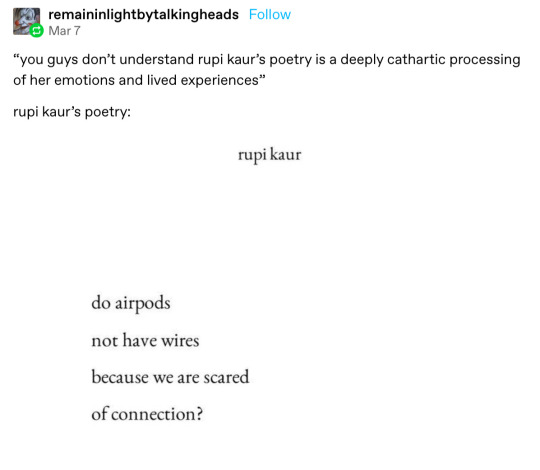
is that like, on one hand, rupi kaur does have the unfortunate position of being the go-to contemp bad poet example. and the people who are out here like “this is an outsized response to mediocrity which is determined in no small part by her being a young brown woman who came up on instagram” are onto something for sure. but you should never let that awareness stop u from recognizing her as a remarkably bad poet. there are poets who have done wonderful things with simple expression, with personal history and catharsis (i beat my drum in perpetuity for gwendolyn brooks. you might also look into for example “father’s bedroom” by robert lowell). there are poets who have done wonderful things in terms of making us question what counts as poetry, and why we should care about its boundaries and capacities. and there are many poets who have just been shallow and boring and relatively unskilled. like the above is the kind of thought that you could very genuinely make interesting if you had half a commitment to form and expression. for example, if you’ve read anything by zizek, arguably one of the foremost philosophers of our time, you’ve read his very famous thing on toilet hermeneutics, which you might express as a surface-level rupi kaur style poem in the following way: do toilets / whisk away our shit quickly / because we fear / to face our own refuse? and his answer is yes, and then he gets a whole lot of interesting if contestable cultural analysis out of it. like a haiku bot has more of a meaningful commitment to form than this, is my point. what’s made accessible or “democratized” here is just like, the barest possible bone of what a poem might be. it’s tiresome to insist that poetry is too rarefied to be accessible to the common man; poetry’s terms of access are rarely as simple as Wealth Leisure and Education. many foremost scholars of the novel, for example, are also not very good readers of poetry— and they have Wealth Leisure and Education in spades. (more valid, maybe, the way that attention is unevenly permitted.) at some point you simply must admit to yourself that you have confused abstract and challenging with inaccessible. there is not this much criticism and theory and philosophy out here because this material is, if you simply gather enough privilege in the form of social capital, really quite easy. the real answer is that many people simply do not care if what they are reading is good or effective poetry, and that they find forms of expression like rupi kaur’s to be meaningful in their own right, and that’s, you know, literally fine!
[caveat i guess is that i’m pretty biased against the poetry as self expression thing because i think it makes for some technically poor poetry; every time i’ve heard a poet i admire speak about their craft, they’re not talking about how they’ve found themselves getting realer or more vulnerable or more cathartic, they’re talking about how they grew in terms of technical skill and capacity. so i had to decide to get over the rupi kaur thing, because really she’s no poorer poet than anyone else who’s out here doing the social media house style thing where you just add line breaks to a series of purple prose struggle tweets— all of it’s fed by a desire to Do Poetry without any real interest in what poetry entails beyond a mirror of the self. and that’s like, fine, i probably find that more offensive than is normal. i’m cranky about mary oliver, who was a perfectly serviceable poet. but you can just SAY you don’t care about poetic merit but that this thing works for you in x y and z ways and just go on your merry way. i promise u.]
7 notes
·
View notes